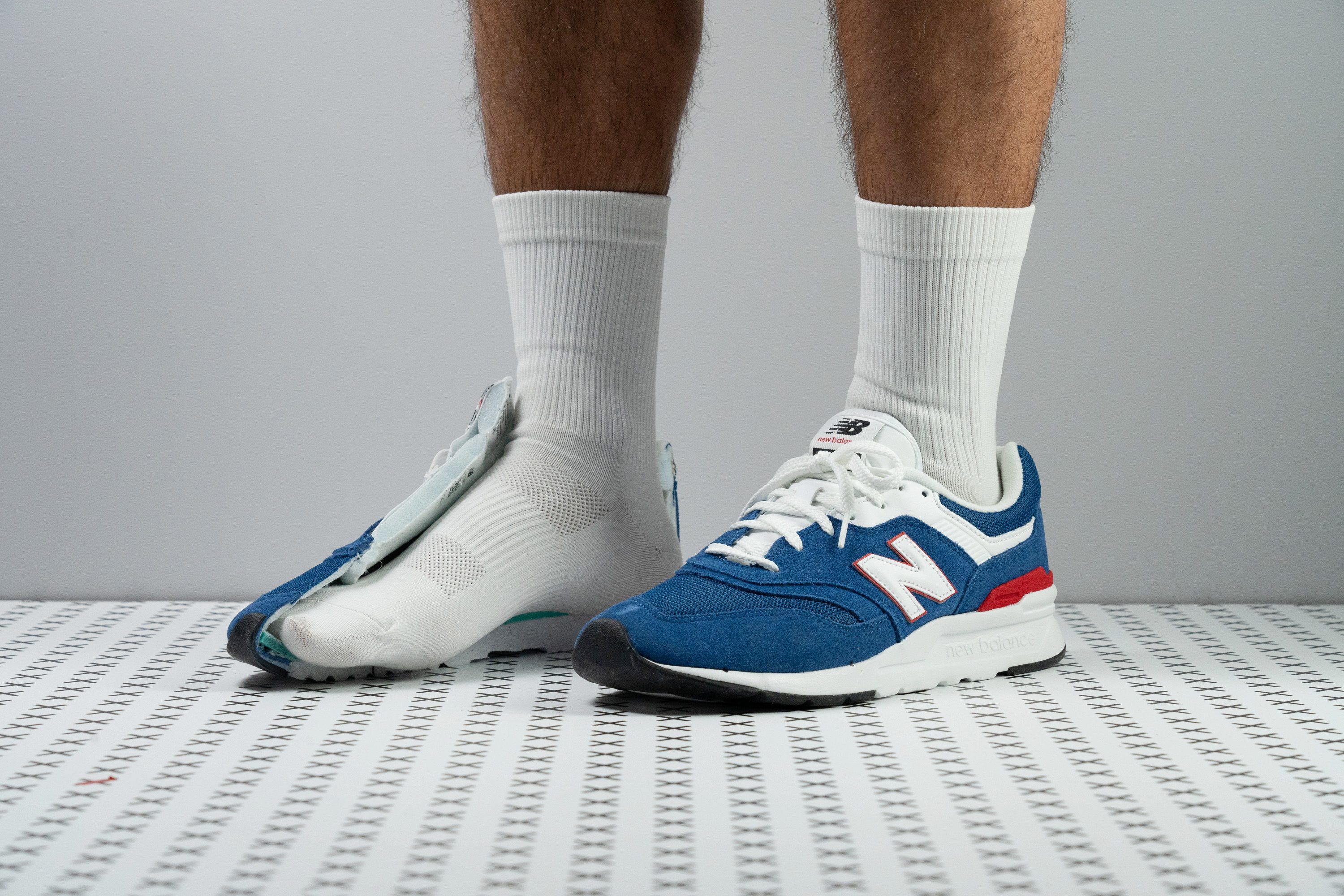Our verdict
- Top pick in best Dad shoe reviews
Pros
- Sleek dad shoe
- Amazingly durable
- Affordable version of 997
- Retro vibes
- True to size
- Feels light to the foot
- Easy to style
- Reliable outsole grip
Cons
- Not so breathable
- So-so stability
Audience verdict
Comparison
The most similar sneakers compared
+ + Add a shoe | |||||
|---|---|---|---|---|---|
| Audience score | 90 Good! | 93 Great! | 91 Great! | 89 Good! | |
| Price | $90 | $80 | $75 | $145 | |
| Style | DadRetroSporty | RetroSporty | ClassicRetroSporty | ClassicDadRetroSporty | |
| Shock absorption | Moderate | High | - | High | |
| Energy return | Moderate | Moderate | - | Moderate | |
| Traction | Moderate | High | - | High | |
| Breathability | Warm | Breathable | Warm | Warm | |
| Weight lab | 12.8 oz / 364g | 11.6 oz / 329g | 11.4 oz / 323g | 13.5 oz / 383g | |
| Size | True to size | True to size | True to size | True to size | |
| Midsole softness | Firm | Firm | Firm | Firm | |
| Material | MeshSuede | Mesh | Leather | MeshSuede | |
| Season | SpringFall | Summer | SpringFall | SpringFall | |
| Inspired from | Running | Running | Running | Running | |
| Width / fit | Medium | Medium | Medium | Medium | |
| Toebox width | Medium | Medium | Narrow | Medium | |
| Leather/suede quality | Real suede | Real leather | Real leather | Real suede | |
| Toebox durability | Good | Decent | Decent | Decent | |
| Heel padding durability | Good | Bad | Bad | Decent | |
| Outsole durability | Good | Decent | Good | Good | |
| Heel stack lab | 27.7 mm | 33.1 mm | 35.7 mm | 35.4 mm | |
| Stiffness | Flexible | Stiff | Stiff | Stiff | |
| Tongue padding | Average | Average | Average | Average | |
| Drop lab | 9.9 mm | 12.7 mm | 13.6 mm | 11.1 mm | |
| Forefoot | 17.8 mm | 20.4 mm | 22.1 mm | 24.3 mm | |
| Removable insole | ✓ | ✓ | ✓ | ✓ | |
| Heel tab | None | None | None | None | |
| Torsional rigidity | Moderate | Moderate | Moderate | Moderate | |
| Heel counter stiffness | Stiff | Moderate | Stiff | Moderate | |
| Reflective elements | ✗ | ✗ | ✗ | ✓ | |
| Closure | Laces | Laces | Laces | Laces | |
| Top | Low top | Low top | Low top | Low top | |
| Ranking | #66 Bottom 45% | #27 Top 23% | #58 Top 48% | #84 Bottom 30% | |
| Popularity | #70 Bottom 42% | #43 Top 36% | #79 Bottom 34% | #9 Top 8% |
Who should buy
Days of wear-testing and lab assessments led us to conclude that the New Balance 997H is greatly suitable for the following:
- sneakerheads who are OK wearing leather since this shoe is made of real suede
- buyers who are on the lookout for sneakers that are durable from the upper down to the outsole
- walkers who want light shoes
- wearers with normal-sized feet
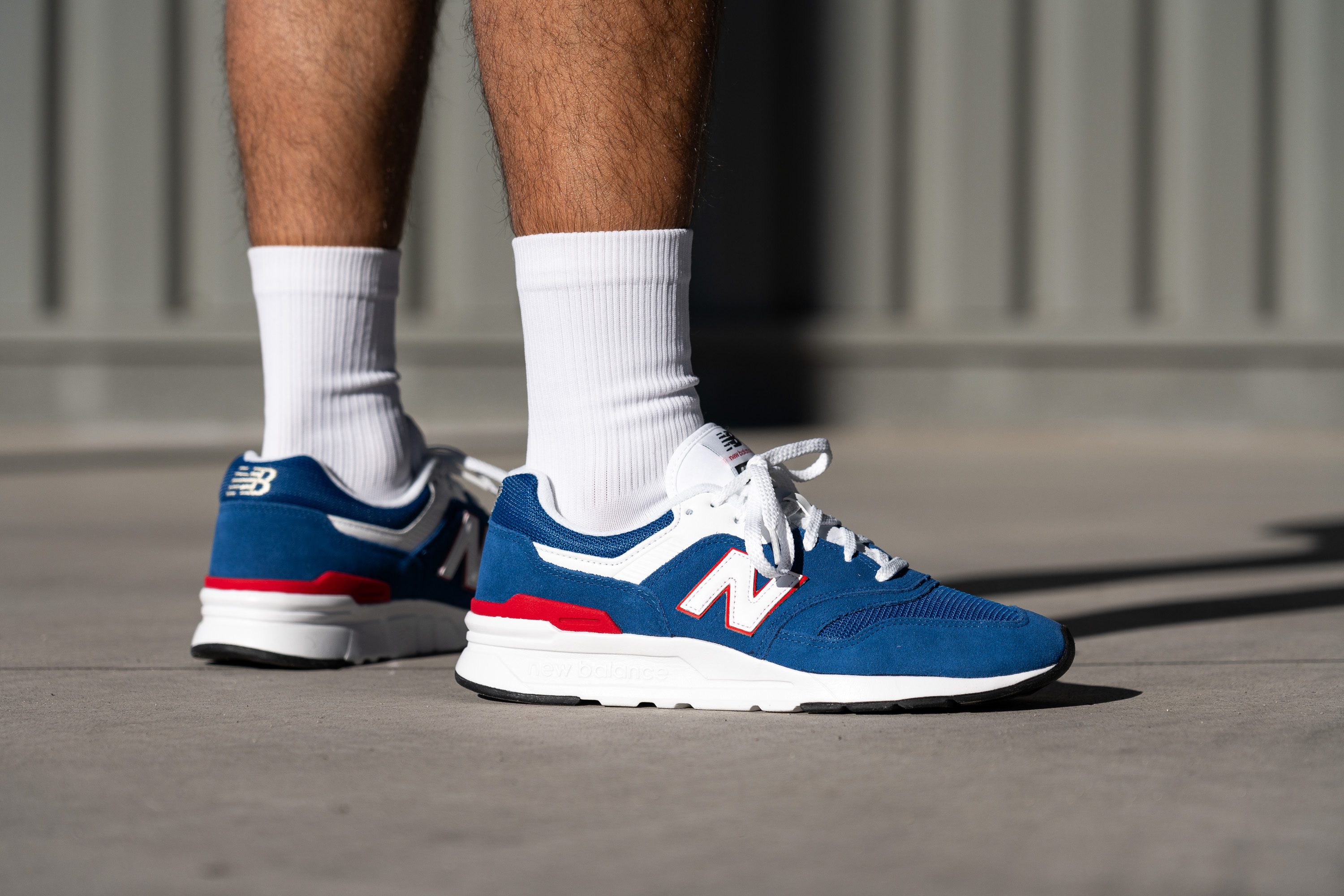
Who should NOT buy
We've established through our experience and lab assessments that the New Balance 997H is not breathable. Wearers with sweaty feet should stay away from this shoe. They are better off with the New Balance 237, which is also cheaper than the 997H. If they are willing to try other brands, the ASICS Gel Lyte III is also a good alternative.
When it comes to stability, we think that the 997H is so-so at best. The New Balance 480 might be a better pick for stability.
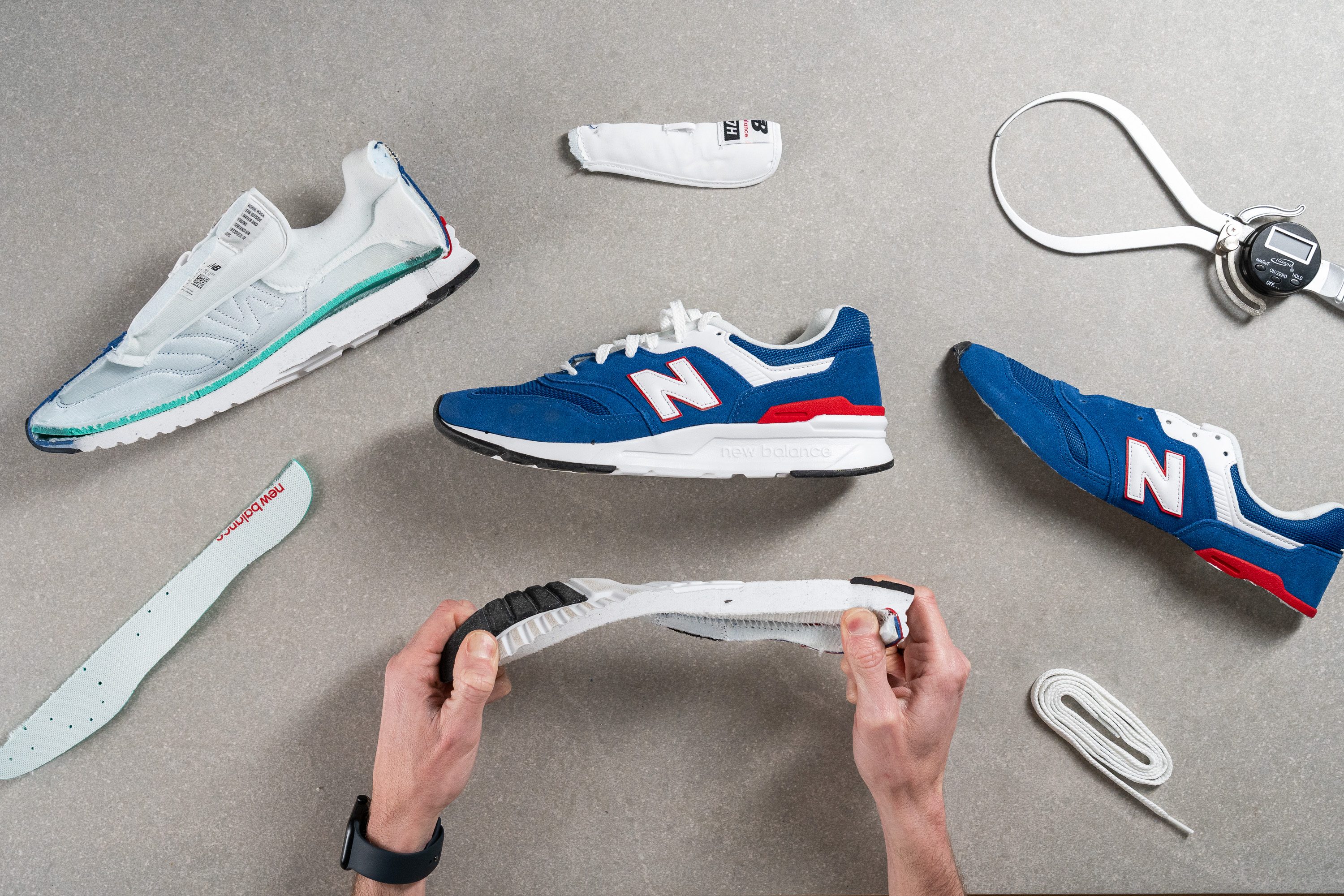
Cushioning
Shock absorption
The NB 997H is not the most abundantly cushioned sneaker, but it doesn't feel completely flat either. It is a perfect example of an average Joe in the shoe world.
Measuring its shock absorption capacity, our machine recorded a moderate reading of 86 SA. This is enough underfoot support for a few hours of walking and, if your feet and joints are not so demanding, for all-day wear too.
But if you're wondering if there are any better-cushioned sneakers from New Balance at the same price point, there are! Shoes like the NB 327 (111 SA) and the NB 237 (109 SA) showed notably higher scores in the same test.
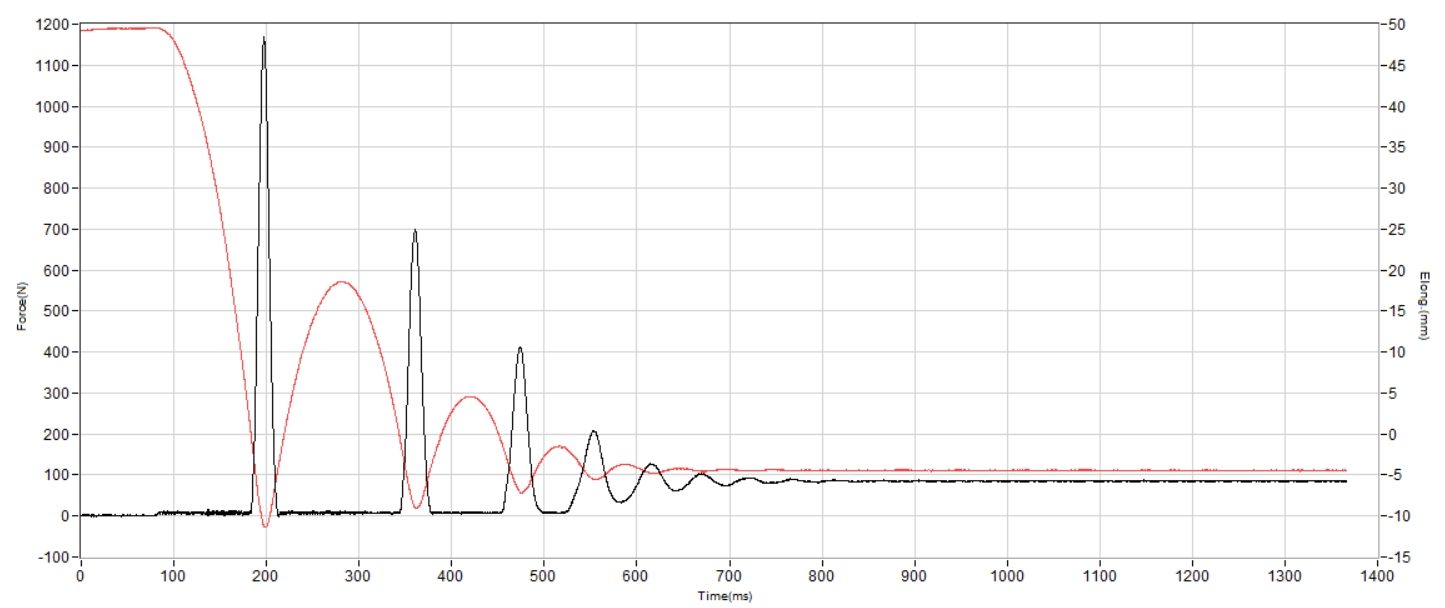
| 997H | 86 SA |
| Average | 89 SA |
Energy return
As a budget-friendly shoe with a basic EVA foam in its midsole, the 997H is not particularly lively either.
With a below-average energy return of 45%, it feels rather dull and flat. But you do get a planted and stable platform in return.
| 997H | 45.5% |
| Average | 50.2% |
Heel stack
We did not have any bad experience with the midsole. It wasn't too thick that we were already worrying about stability. And it wasn't too thin that it lacked impact protection either.
True enough, our caliper measured the heel height to be only 27.7 mm, a number quite close to the average.
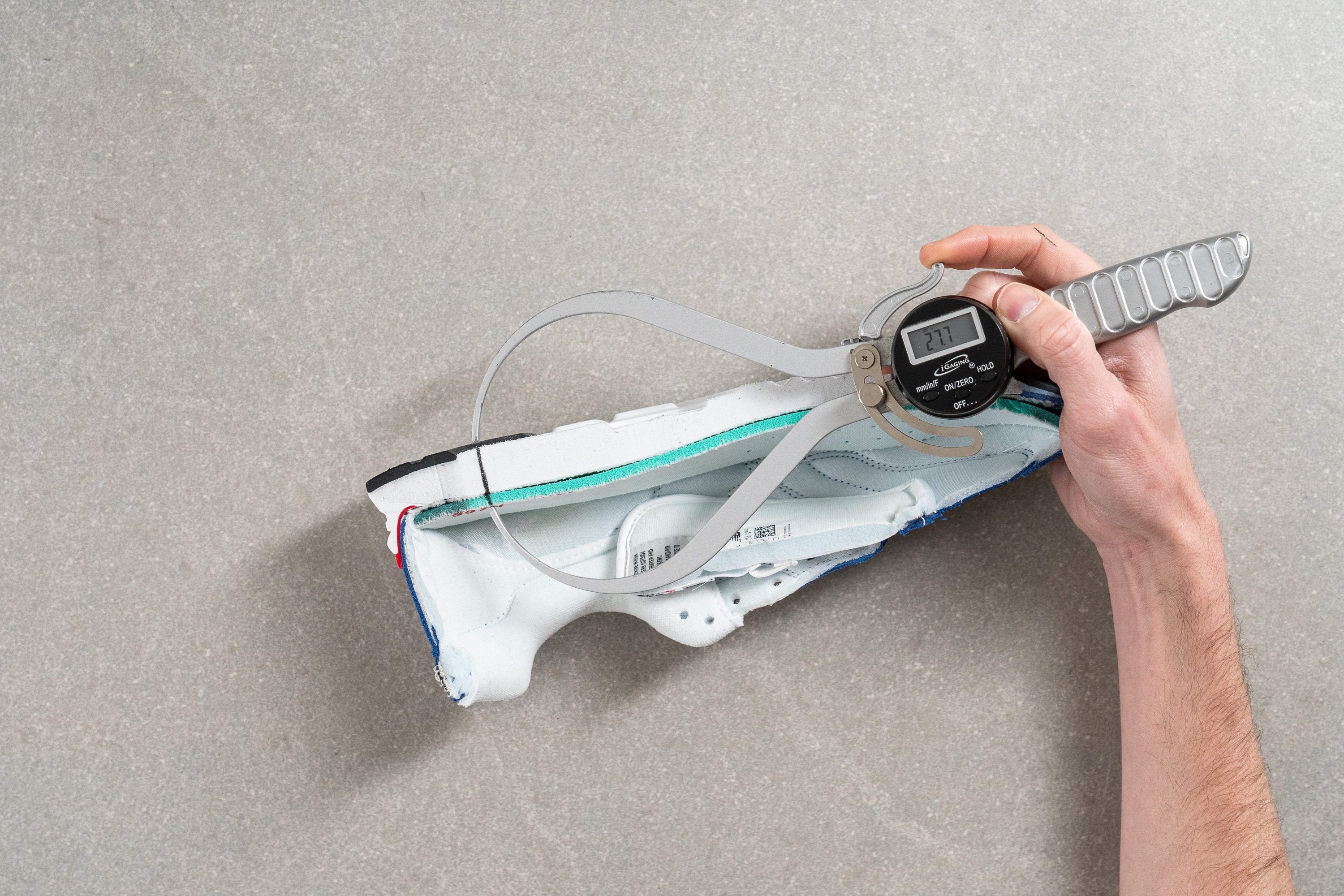
| 997H | 27.7 mm |
| Average | 30.7 mm |
Forefoot stack
Just like the heel, the forefoot part of the midsole is also as thick as the average at 17.8 mm.
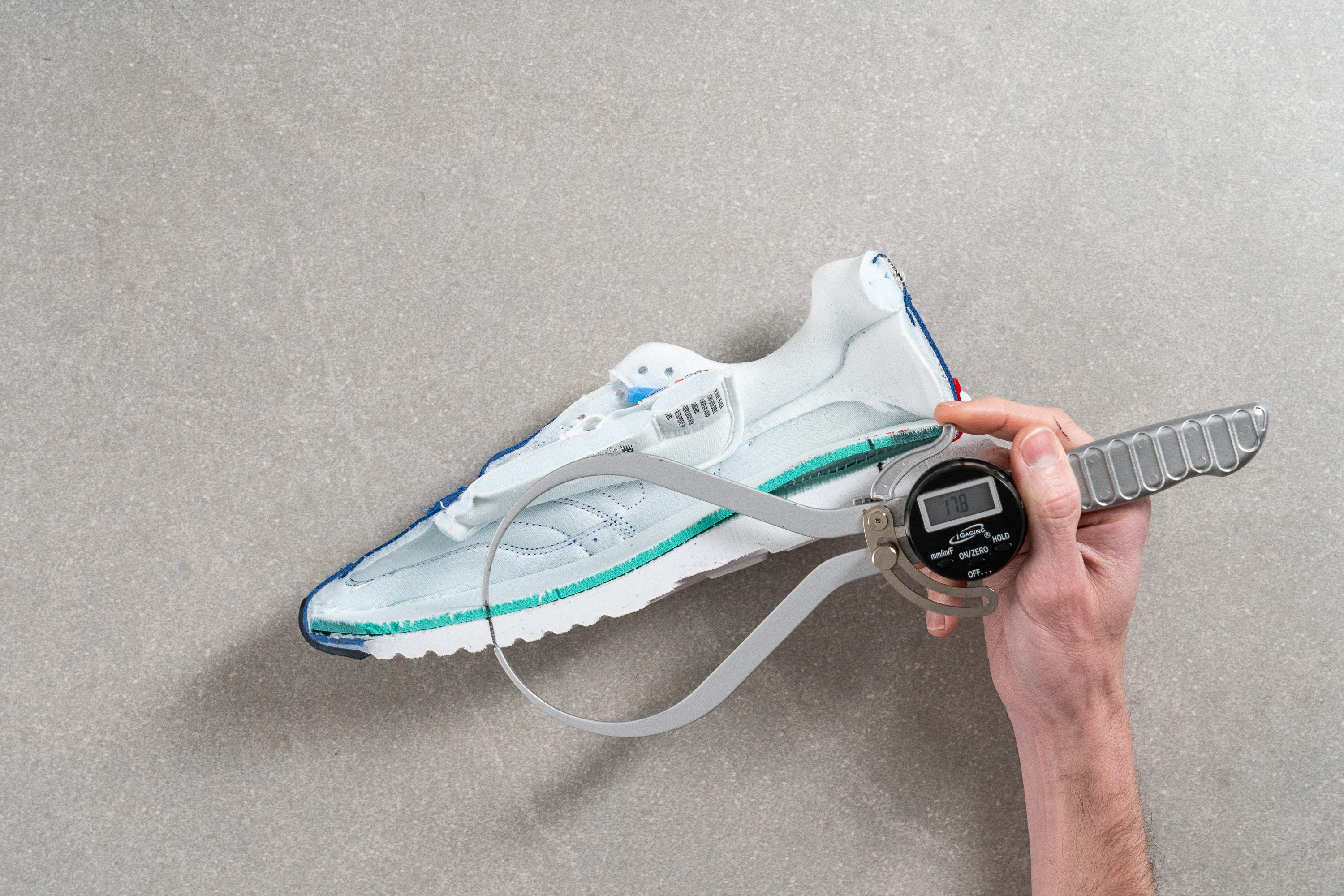
| 997H | 17.8 mm |
| Average | 19.5 mm |
Drop
Transitioning from heel to toe was not a problem because the difference in height between the forefoot and the rearfoot wasn't so pronounced.
Based on our calculations in the lab, the New Balance 997H had a heel-to-toe drop of 9.9 mm.
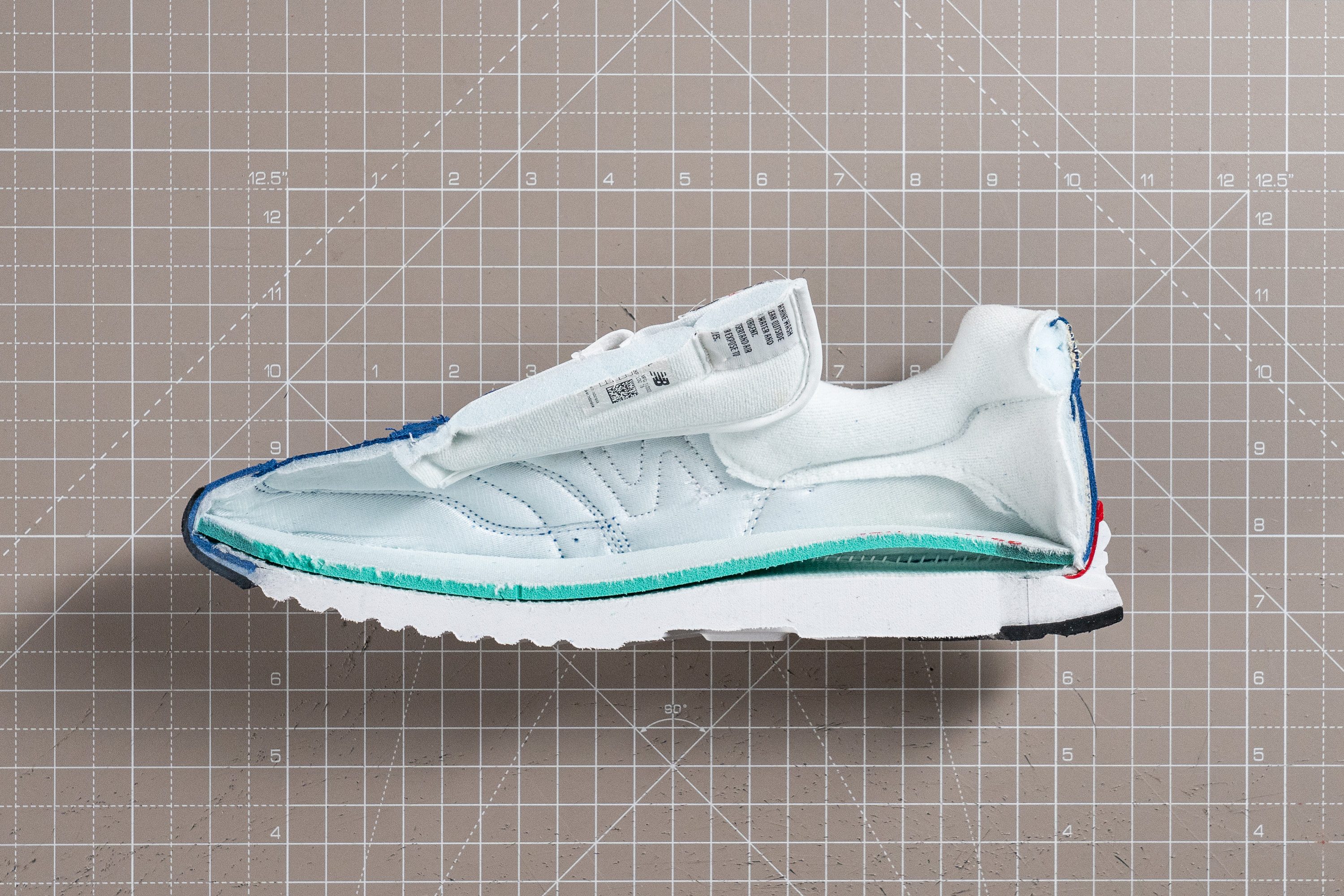
| 997H | 9.9 mm |
| Average | 11.2 mm |
Midsole softness
Based on our experience, the midsole delivered what was necessary. It was firm enough to ensure lasting stability. It was also soft enough to ensure we were comfortable even after walking long distances.
Our HA durometer measured its softness to be 32.5 which is more or less equal to the average.
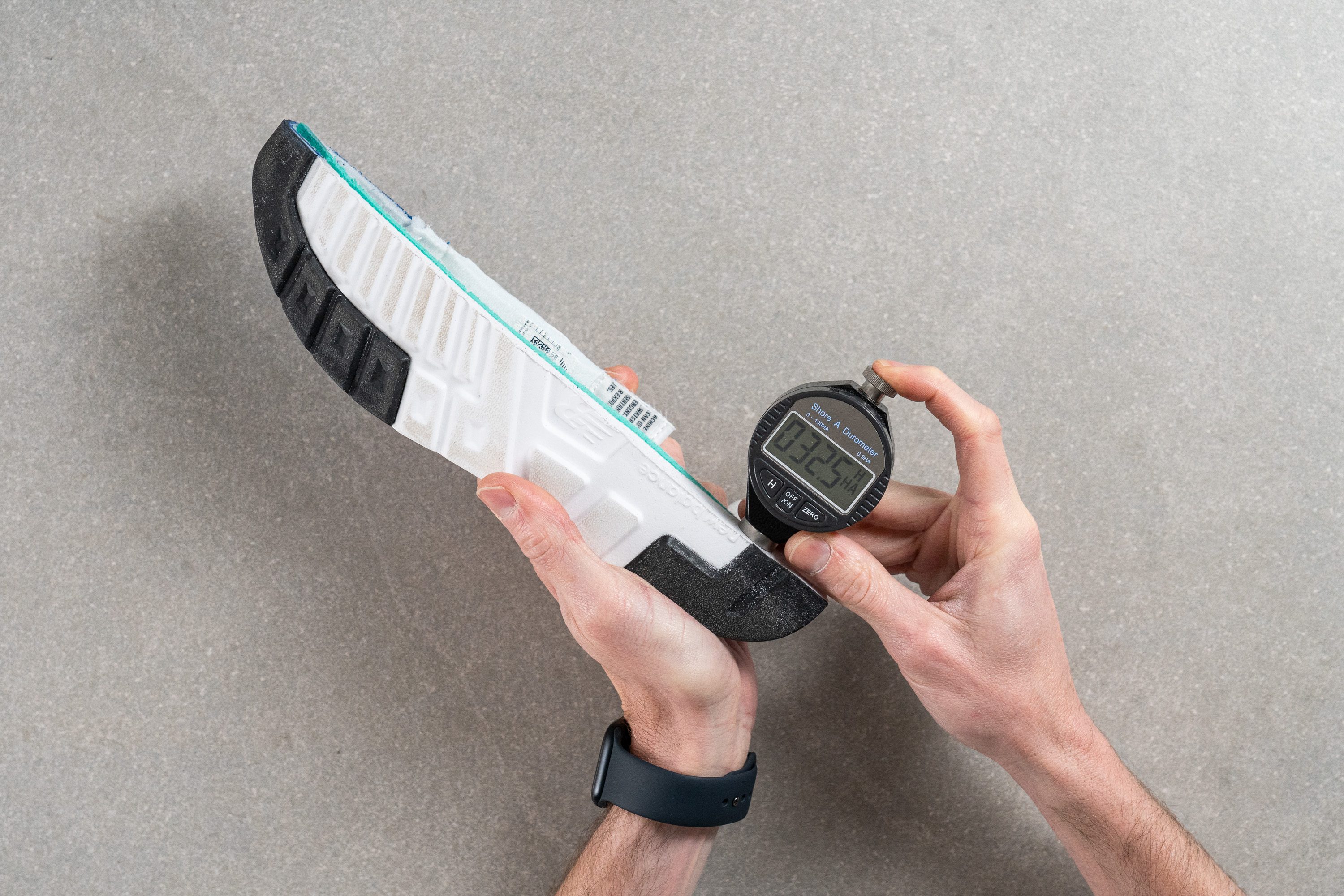
| 997H | 32.5 HA |
| Average | 28.6 HA |
Size and fit
Size
New Balance 997H fits true to size (90 votes).
Internal length
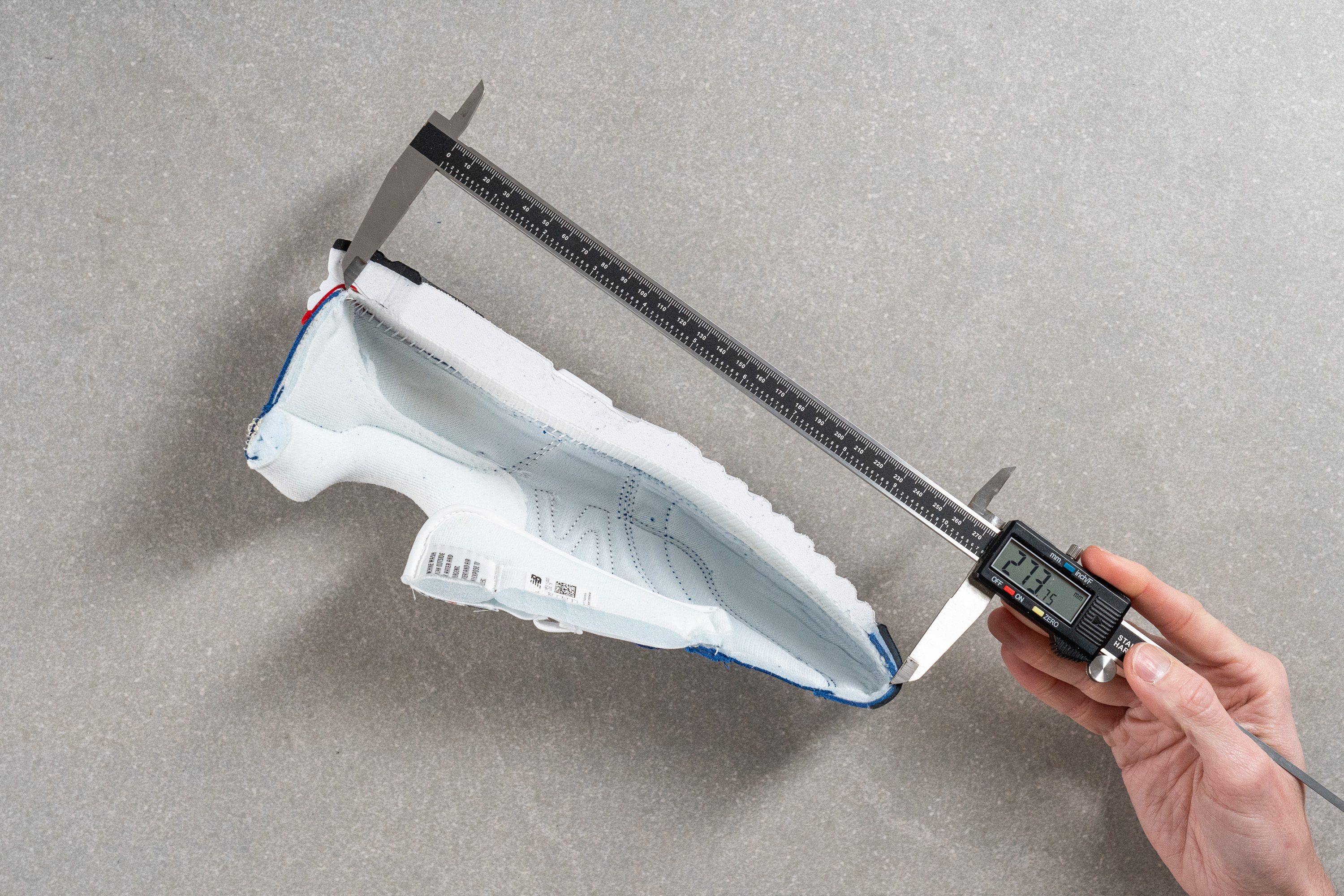
| 997H | 273.8 mm |
| Average | 272.3 mm |
Width / Fit
Medium-width feet can expect an accommodating fit in the New Balance 997H. We felt no dead space or pressure points during the wear test and our gel mold of the shoe's interiors confirmed that.
Using a digital caliper and a custom shoe holder, we measured the widest part of the mold (between the pinkie and the big toe) at 93.1 mm. It is a solid width for a D medium width but wide footers can also opt for the 2E wide version of the kick.
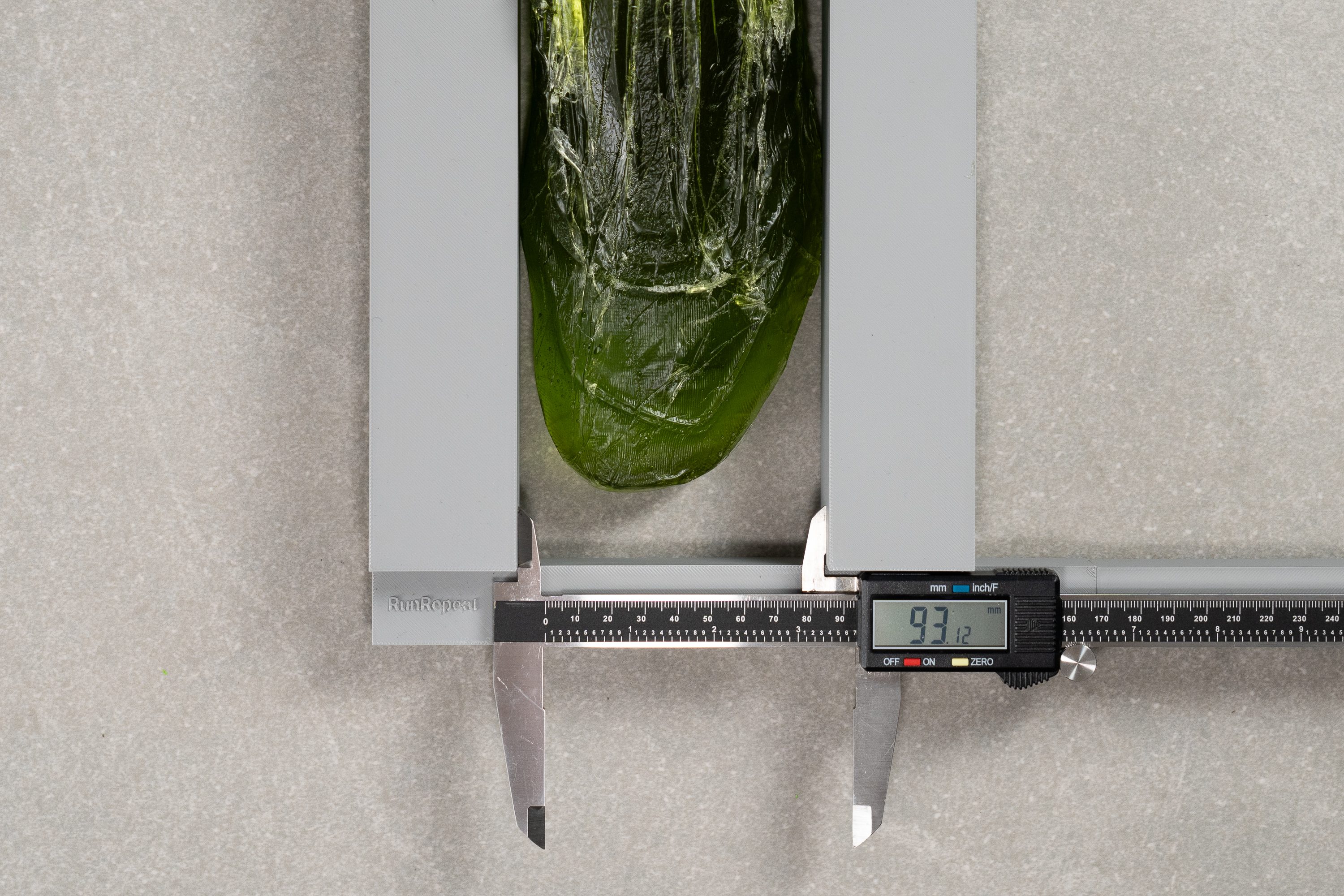
| 997H | 93.1 mm |
| Average | 92.5 mm |
Toebox width
The taper angle is also very moderate in this NB sneaker showing a standard width of 69.5 mm near the big toe. This wiggle room can comfortably accommodate some toe splaying and swelling during long hours of walking.
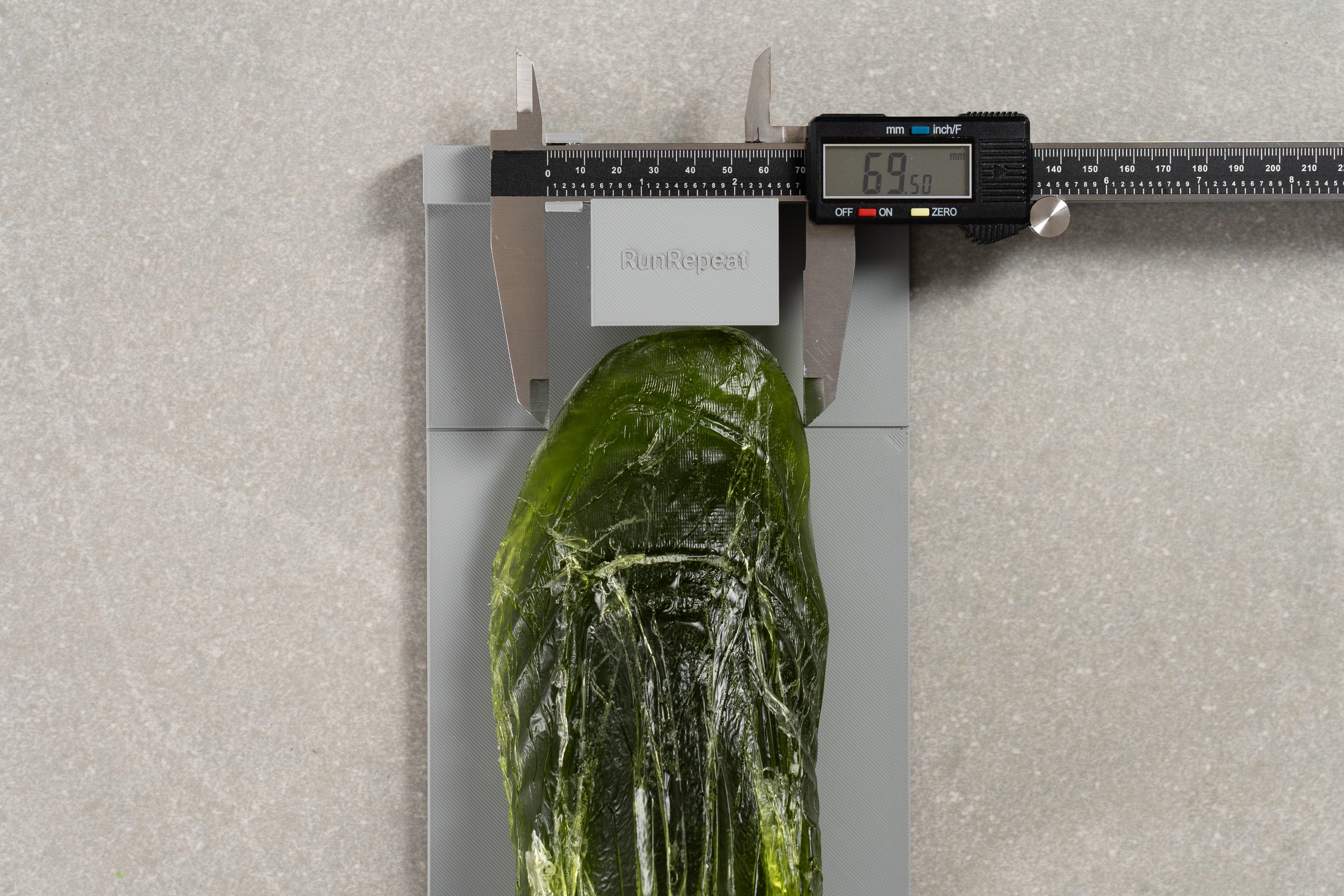
| 997H | 69.5 mm |
| Average | 68.9 mm |
Toebox height
With a toebox height of 25.8 mm, the 997H also provides ample vertical space above the toes.
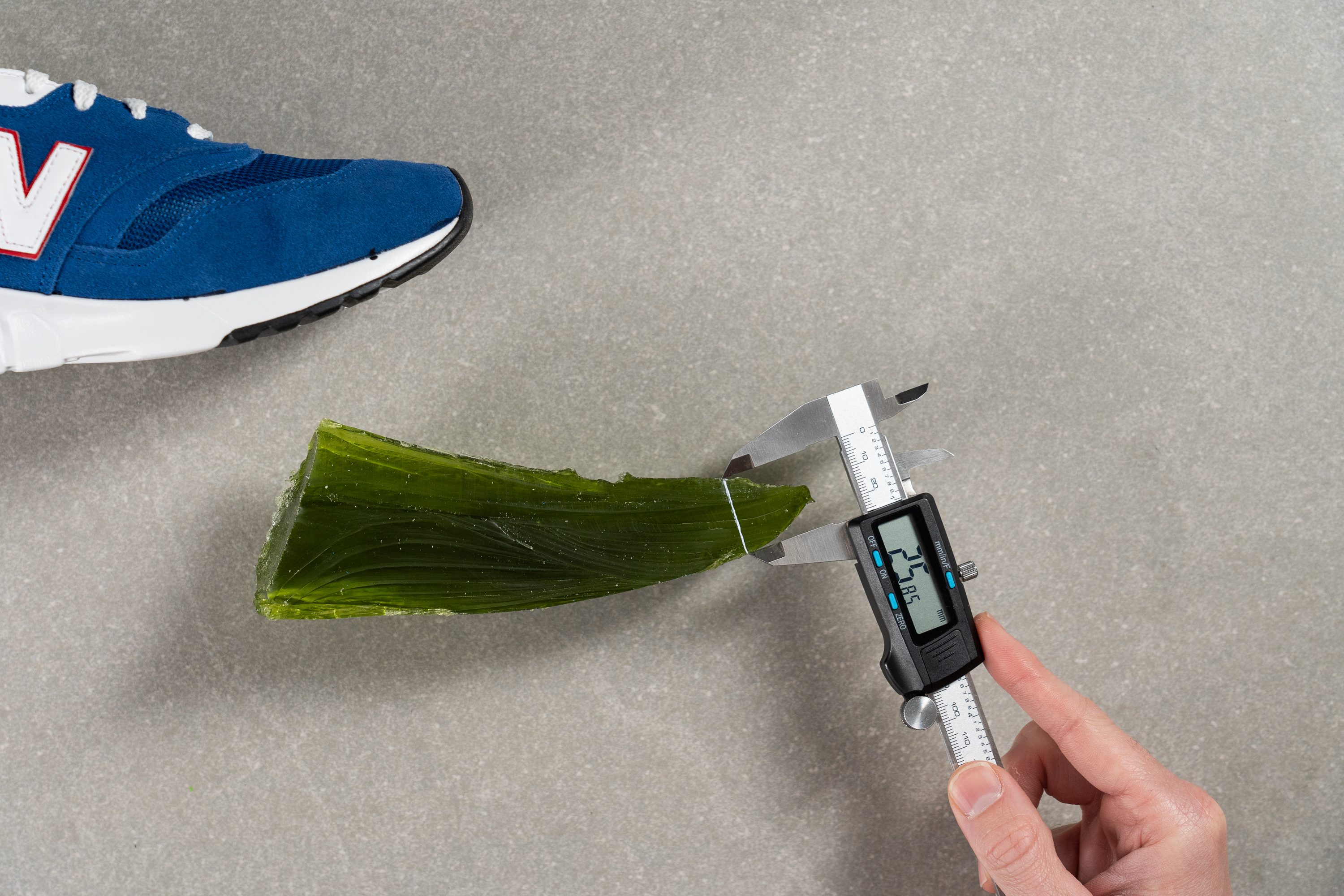
| 997H | 25.8 mm |
| Average | 27.8 mm |
Traction / Grip
Traction test
The 997H's outsole doesn't look very confidence-inspiring with its exposed foam, smooth and shallow treading, and minimal rubber coverage. And yet, our grip testing machine showed a reassuring coefficient of friction of 0.43.
The shoe's heel generated good friction against wet concrete under a repetitive stomping motion which mimicked a walking person's heel strike. That way, you can expect great grip not only on dry sidewalks but on wet ones too. Just be careful on treacherously slick surfaces like wet mall tiles or wet stone stairs.
| 997H | 0.43 |
| Average | 0.43 |
Outsole design
The New Balance 997H proves that you can get excellent outsole durability and grip even with minimal rubber coverage on a budget-friendly shoe.
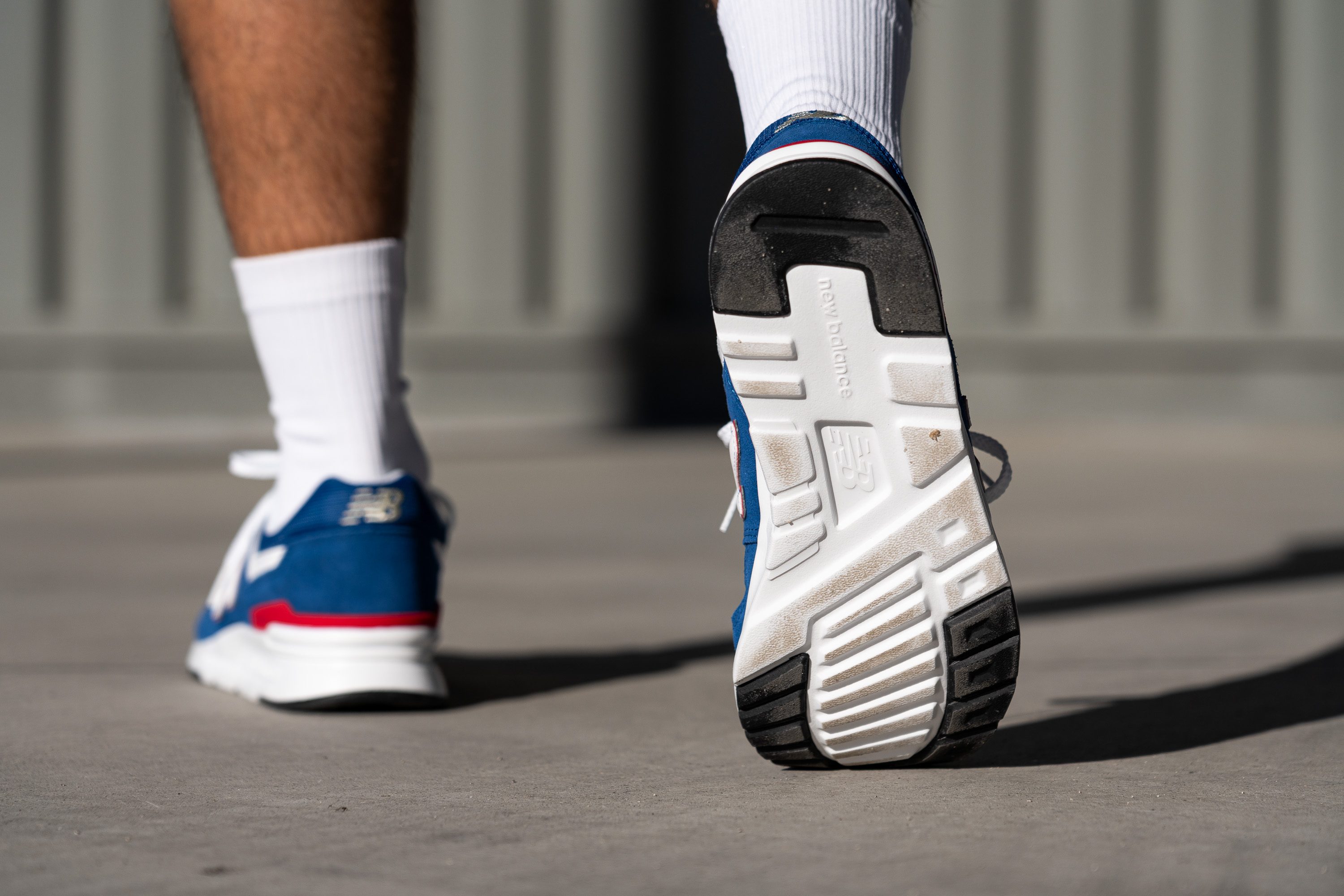
Flexibility / Stiffness
It was such a pleasure to wear the New Balance 997H because it felt more flexible than usual. We never had problems bending our feet when we had to tiptoe, for example, because the shoe went so well with our movements.
Performing the usual flexibility test on this New Balance sneaker, we found that it needed only 8.0N of force to bend by 30 degrees. That is significantly less force than the average sneaker requires.
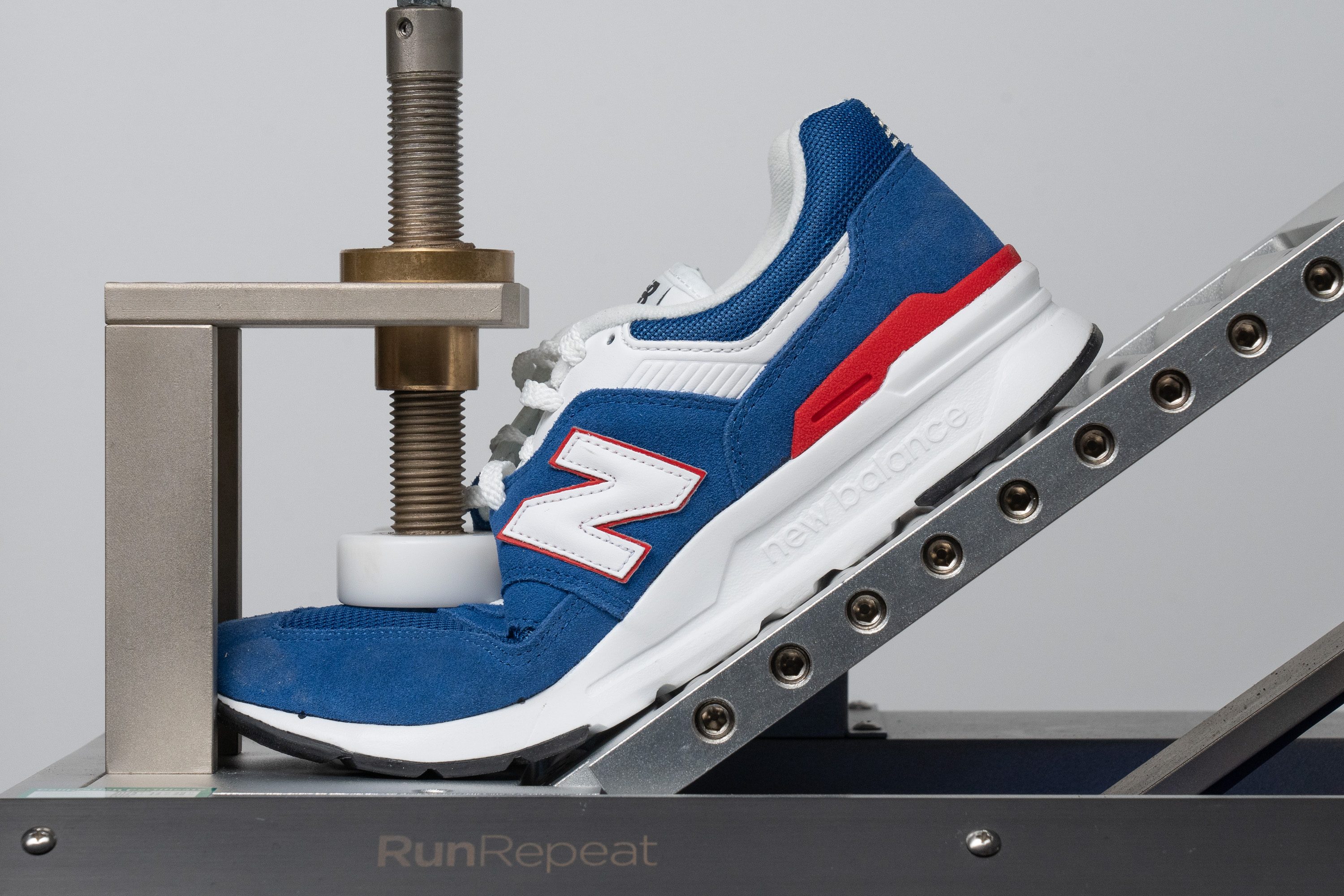
| 997H | 8.0N |
| Average | 13.3N |
Weight
We have to say; the New Balance 997H truly felt light on the feet. Our steps were effortless and smooth because of its lightness.
We were surprised to learn this NB sneaker was only slightly lighter than average at 12.8 ounces or 364 grams.
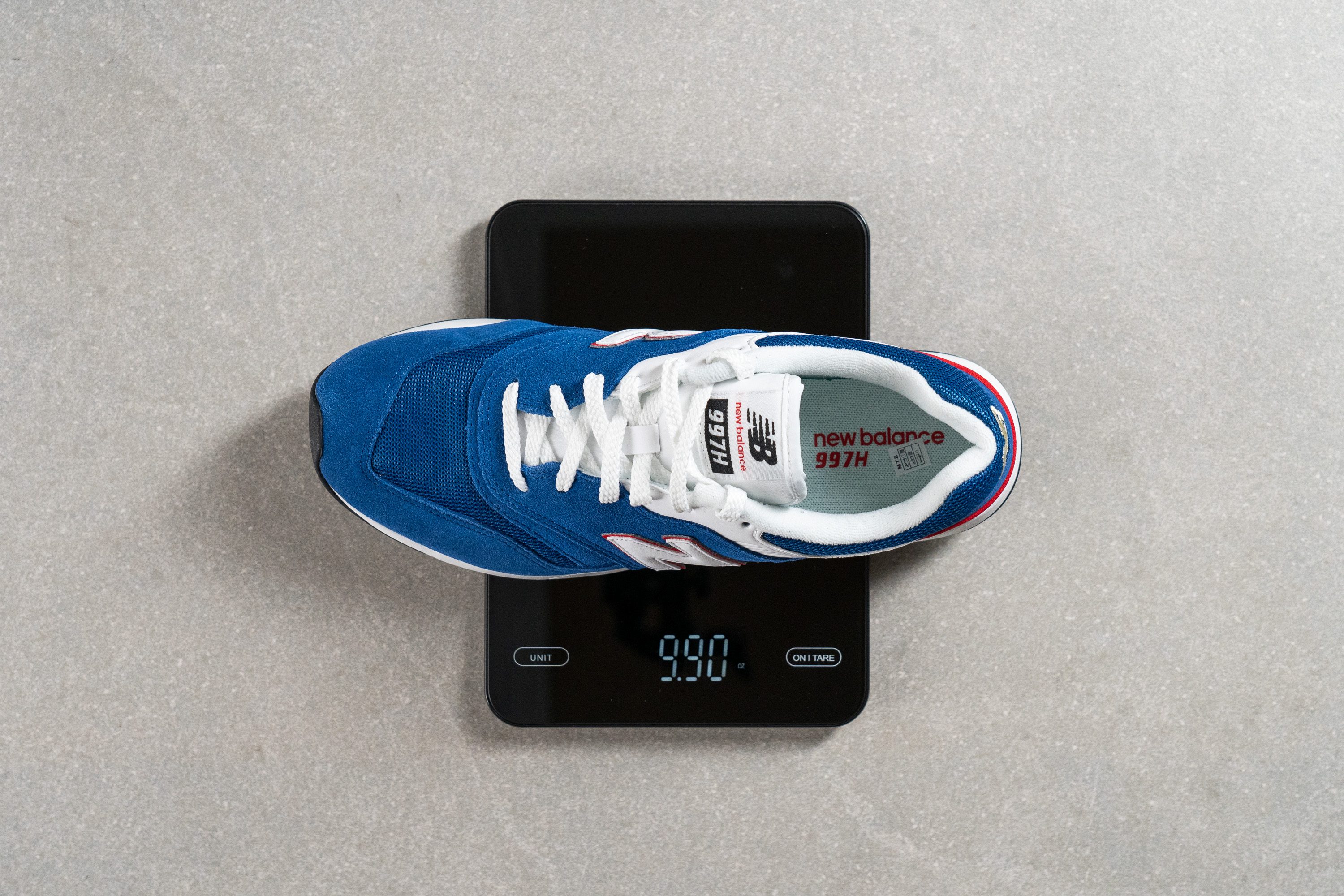
| 997H | 12.8 oz (364g) |
| Average | 13.8 oz (390g) |
Breathability
The 997H had that distinct New Balance look, and we were all there for it... if only it wasn't too toasty. This sneaker is really NOT a living thing because it really doesn't know how to breathe! Properly, that is.
We performed the usual smoke test on this shoe, and it was too regrettable to watch that the smoke was only able to escape (and slowly, at that!) through the tongue. It would be a crime to give this sneaker a rating better than 2 out of 5 for ventilation!
The 997H had almost the same look and structure as the New Balance 57/40 (rating is 4 out of 5), but the latter allowed smoke to escape even through the toebox. The video above clearly shows what we mean.
When placed over a light source, it's quite shocking to see that light was only able to pass through the lace holes.
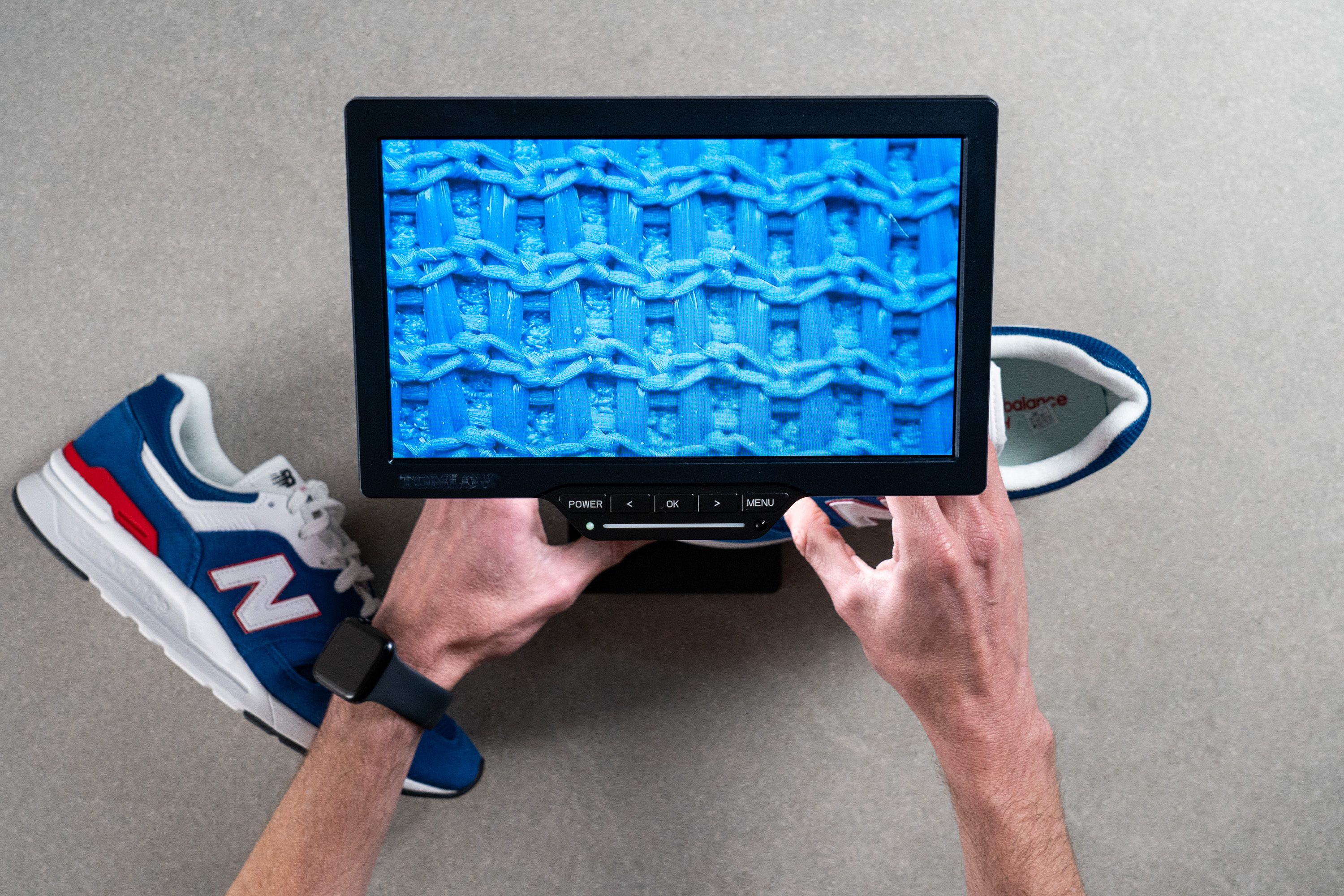
What we saw under the microscope convinced us that good breathability was never the goal of the NB 997H. The material used for the toebox appeared to be multilayered, with every possible vent tightly covered as if a pretty dangerous criminal was jailed inside.
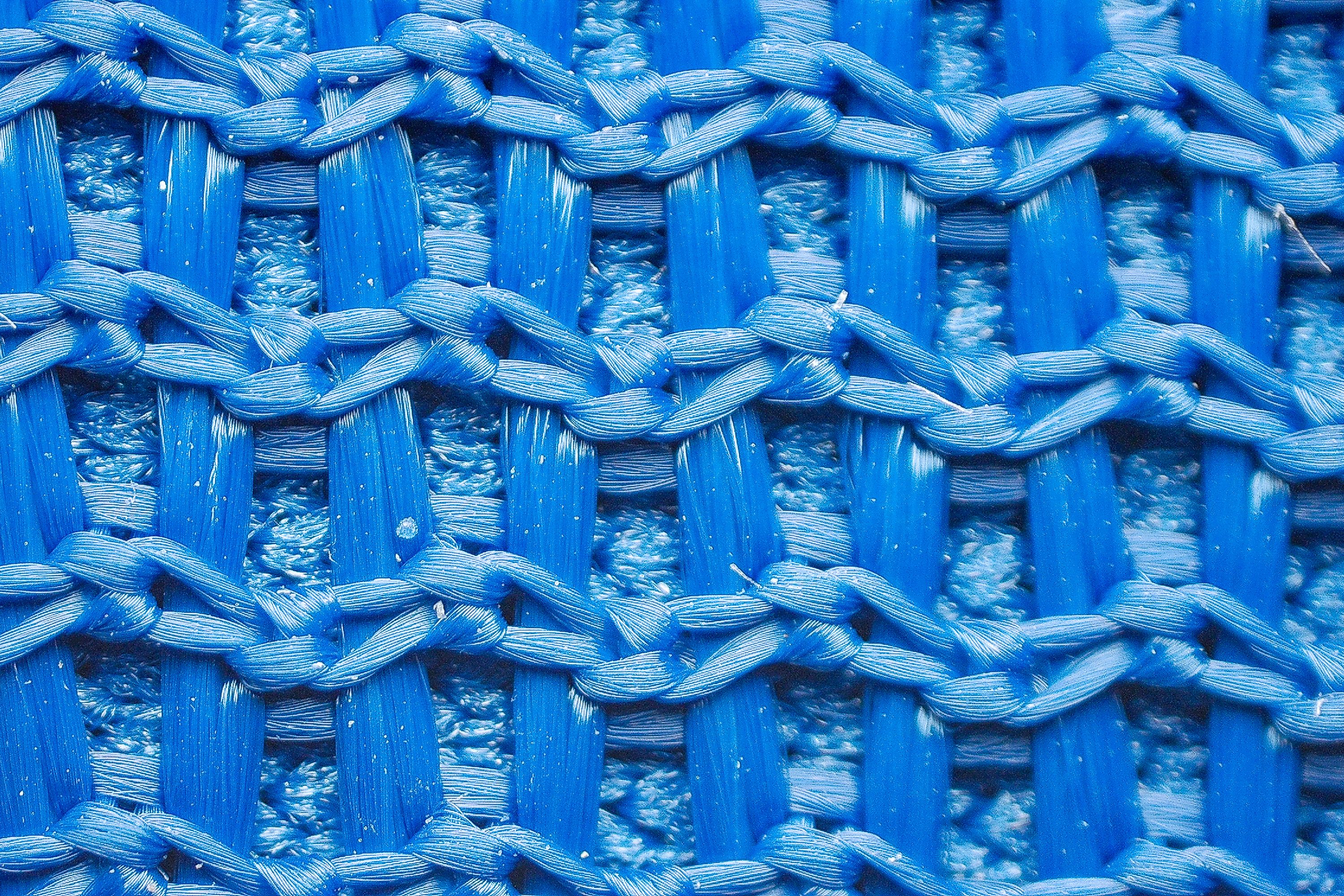
| 997H | 2 |
| Average | 3 |
Stability
Lateral stability test
Though it was not the best, the New Balance 997H still delivered enough lateral stability to keep us on the footbed. From its moderately responsive sidewalls and typically wide platform, many features worked in synergy to stabilize our steps.
Of course, better picks exist as far as lateral stability is concerned, and the Adidas Alphaboost V1 is easily one of them.
Torsional rigidity
We could say that twist protection was satisfactory with the NB 997H.
Back in the lab, the whole structure of the sneaker showed only moderate resistance to our twisting. We gladly gave it a score of 3 over 5 for torsional rigidity.
| 997H | 3 |
| Average | 3.6 |
Heel counter stiffness
This sneaker, we feel, owed much of its stability to the secure clasp of its heel counter. The rearfoot surely couldn't go anywhere because of how arrested it felt while we were wearing the New Balance 997H.
We gave the heel counter a good squeeze in the lab, and its resistance to it was quite intense. We had to sweat a lot before it started to yield to the pressure that we applied. A perfect 5; no other score befitted such a performance.
| 997H | 5 |
| Average | 3.2 |
Midsole width - forefoot
The footprints left by the New Balance 997H were not overly wide or painfully narrow. Our caliper measured the forefoot to be 111.4 mm wide.
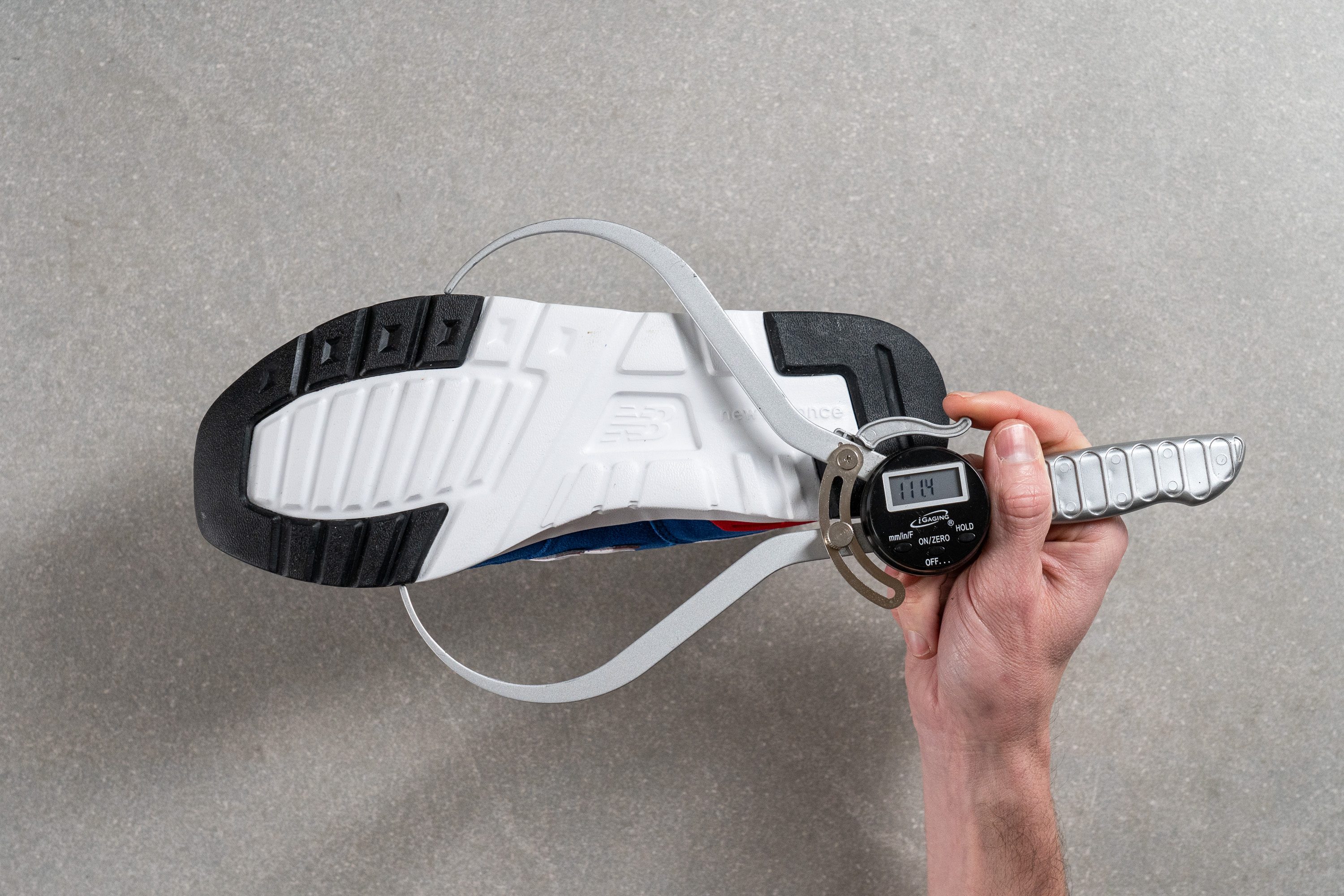
| 997H | 111.4 mm |
| Average | 108.9 mm |
Midsole width - heel
Just like the forefoot, the heel area was just as wide as the average at 81.3 mm.
Now, did the averageness of the platform widths cause any problems? Not at all! They were enough to contain our feet and ensure that our steps felt stable. The NB 997H was one of those shoes that convinced us that stability was not all about size, how the parts were implemented or configured matters as well.
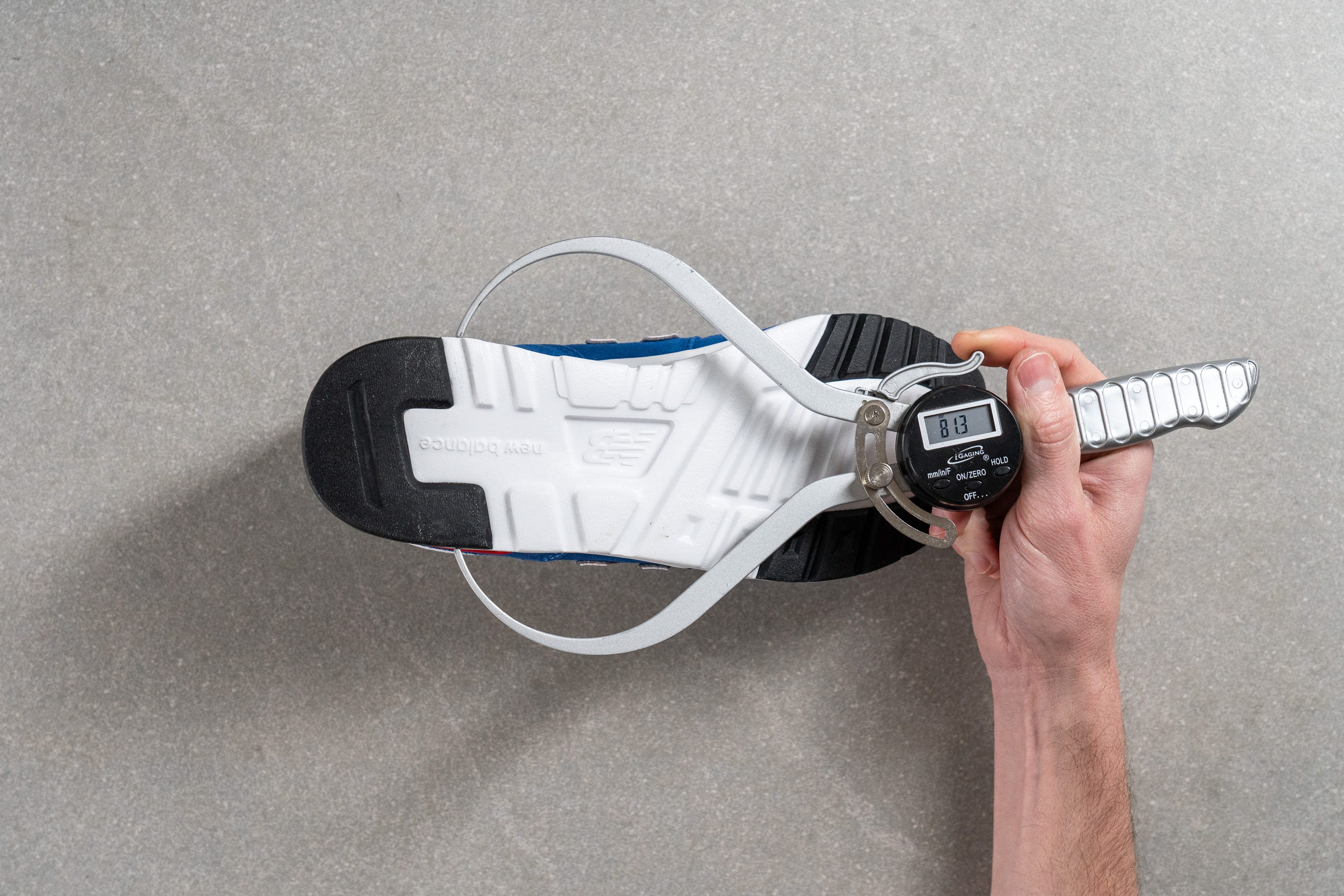
| 997H | 81.3 mm |
| Average | 84.0 mm |
Durability
Leather/Suede quality
The tightly closed-off material only covered the top of the toebox. The rest of the shoe was made of a velvety material which we found to be genuine suede back in the lab.
We torched a portion of the sidewall, and it immediately smelt like burning hair. We probed the burnt area with our awl and we saw that the material remained relatively intact except of course for the ugly discoloration. Only real suede has this kind of effect when burned.
| 997H | Real suede |
Toebox durability
Being made of real suede, we never doubted the shoe's durability. And we were not disappointed. Not even in the slightest bit.
Our aggressive Dremel drilling on the toebox barely scratched its surface. No wonder no signs of wear and tear were seen even if we carelessly bumped the New Balance 997H on various surfaces during our wear tests.
It was a perfect 5 for us as far as toebox durability was concerned. Compare the 997H with the New Balance 530, which got a 1 out of 5, in the photo below and the sturdiness of the former becomes even more apparent.
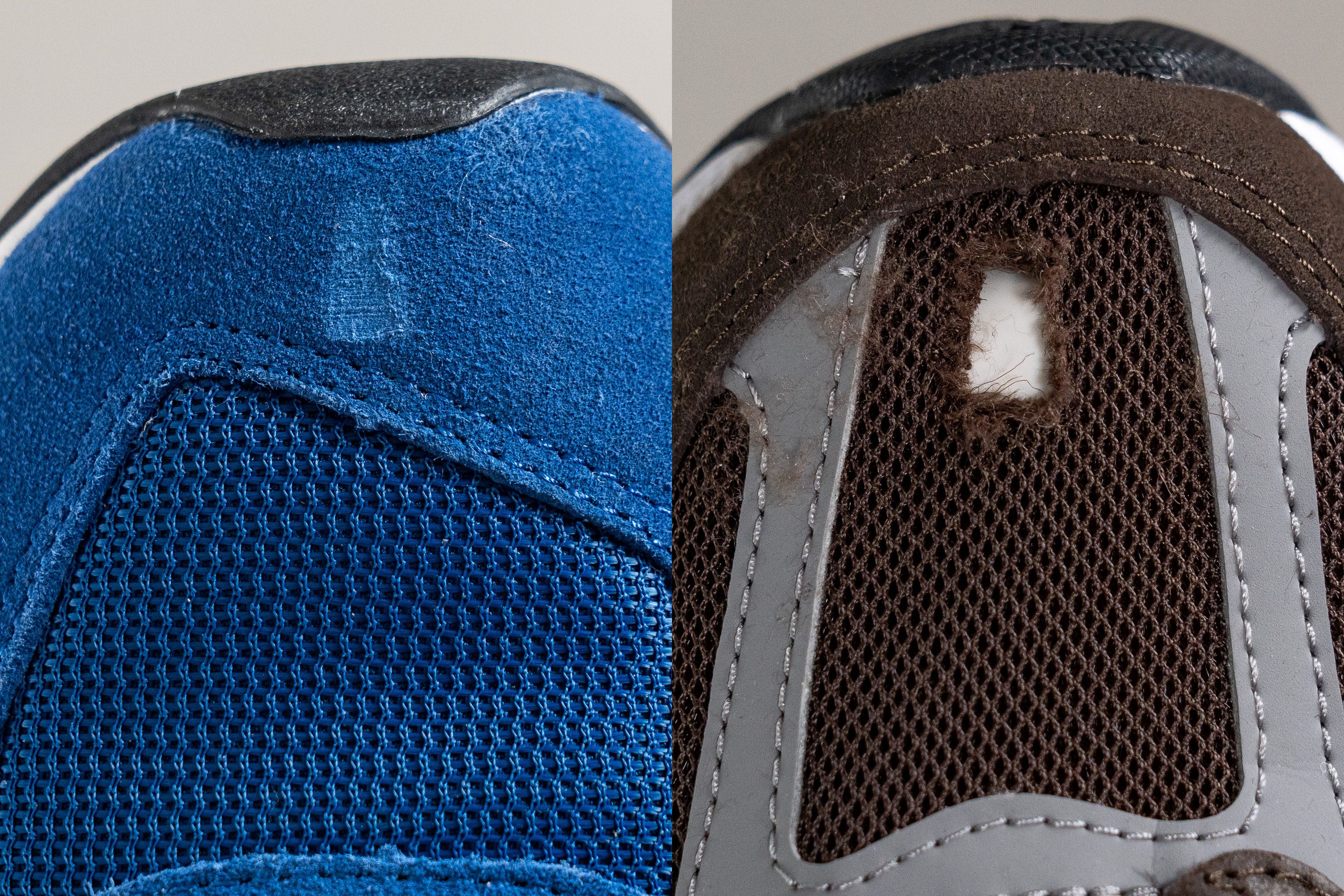
| 997H | 5 |
| Average | 3.7 |
Heel padding durability
We were glad that the suede outer layer was not the only sturdy thing. The heel padding was quite resistant as well, and it never faltered as our skin or socks rubbed against it during aggressive movements.
In the lab, even our high-pressure Dremel became a laughingstock when it barely left a mark on the heel padding. The New Balance 997H remained immaculate. Under similar circumstances, NB 237 ended up with a gaping hole and just gave up the ghost!
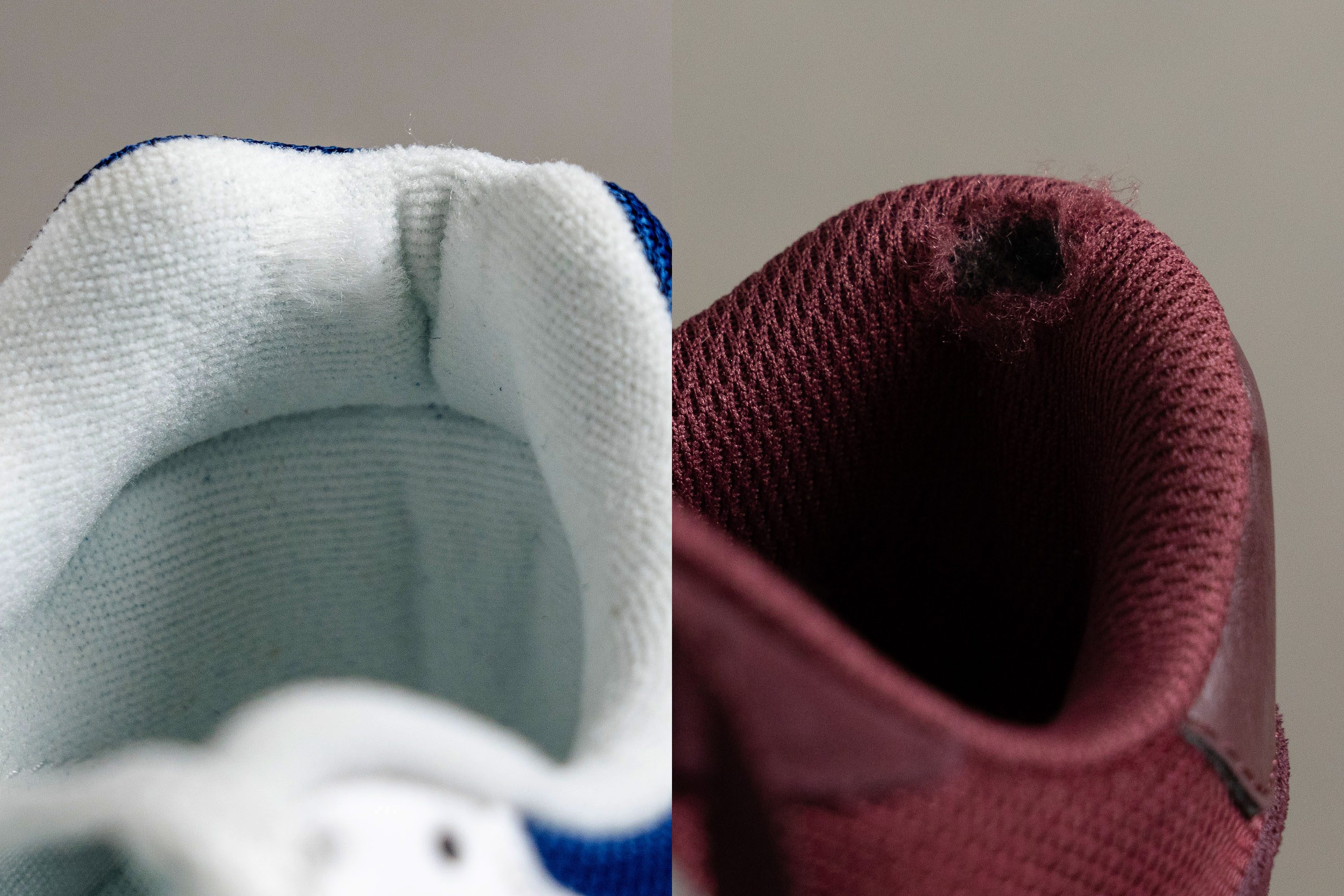
| 997H | 5 |
| Average | 3.2 |
Outsole hardness
Our HC durometer gave the outsole a hardness rating of 86.8, making it just as hard as the average outsole. Experience-wise, we did not notice anything unusual, either.
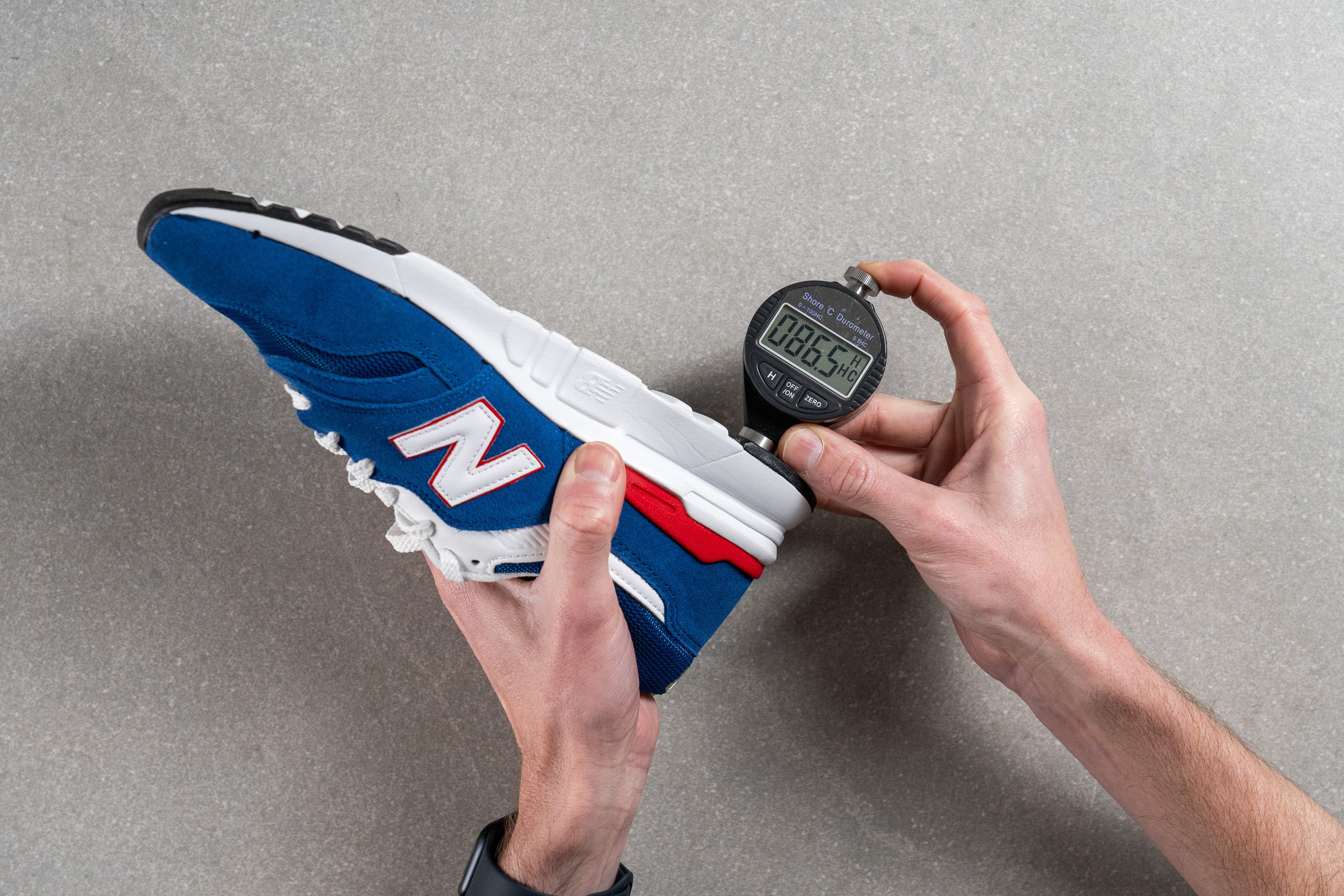
| 997H | 86.8 HC |
| Average | 85.7 HC |
Outsole durability
The New Balance 997H is another proof that hardness is not always equal to durability. While the outsole had average hardness, its durability was off the charts!
Our Dremel drilling on the outsole resulted only in 0.5 mm damage. This is only half of what we normally see in a typical sneaker's outsole after going through the same amount of abuse.
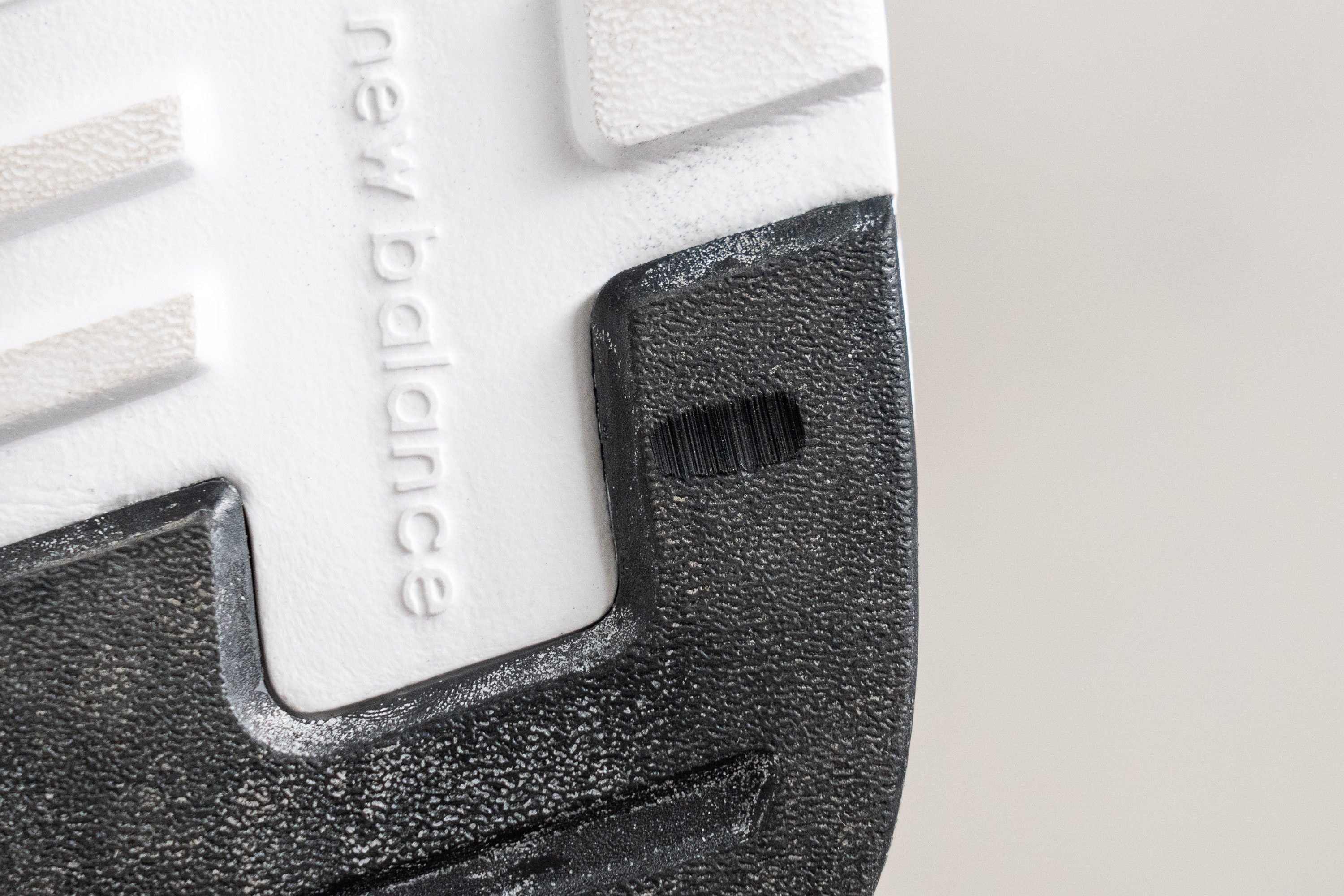
| 997H | 0.5 mm |
| Average | 1.1 mm |
Outsole thickness
At 4.9 mm thick, the outsole was of average thickness.
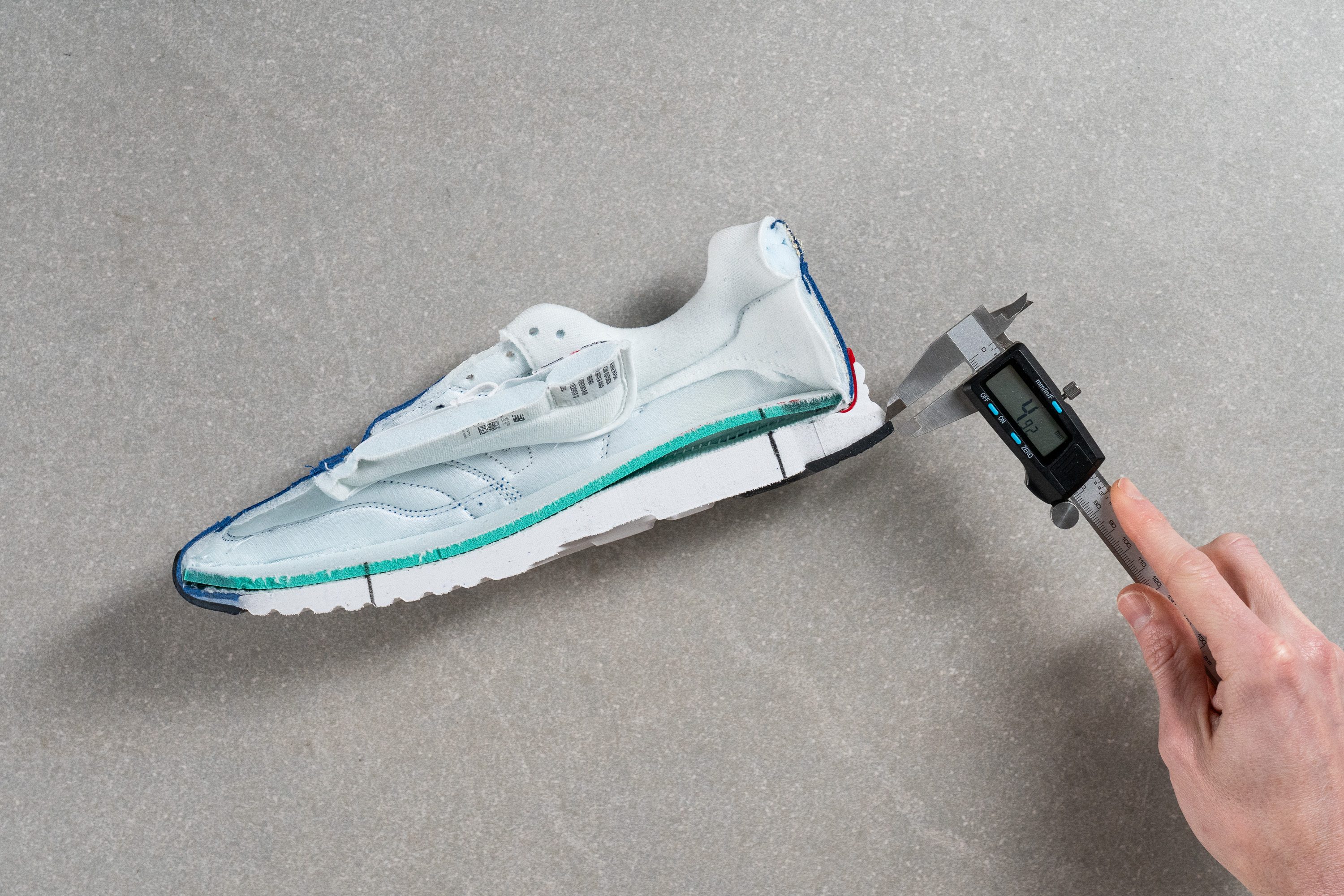
| 997H | 4.9 mm |
| Average | 5.3 mm |
Misc
Insole thickness
The insole was of average thickness. Our caliper measured it to be 4.7 mm thick.
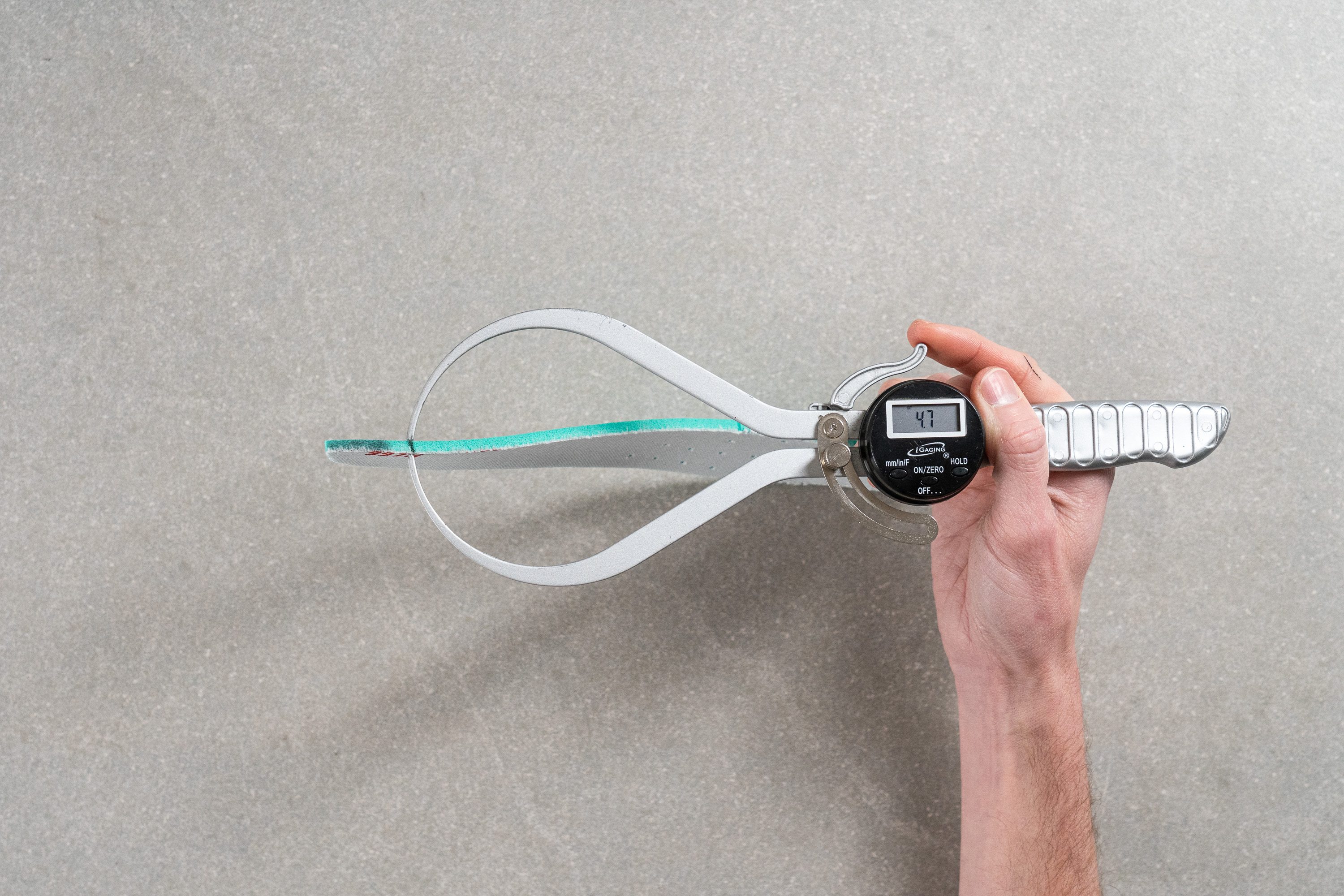
| 997H | 4.7 mm |
| Average | 5.1 mm |
Removable insole
The New Balance 997H came with a removable insole. It was easy to get it out when we needed to use inserts of just wanted to have more space inside the sneaker.
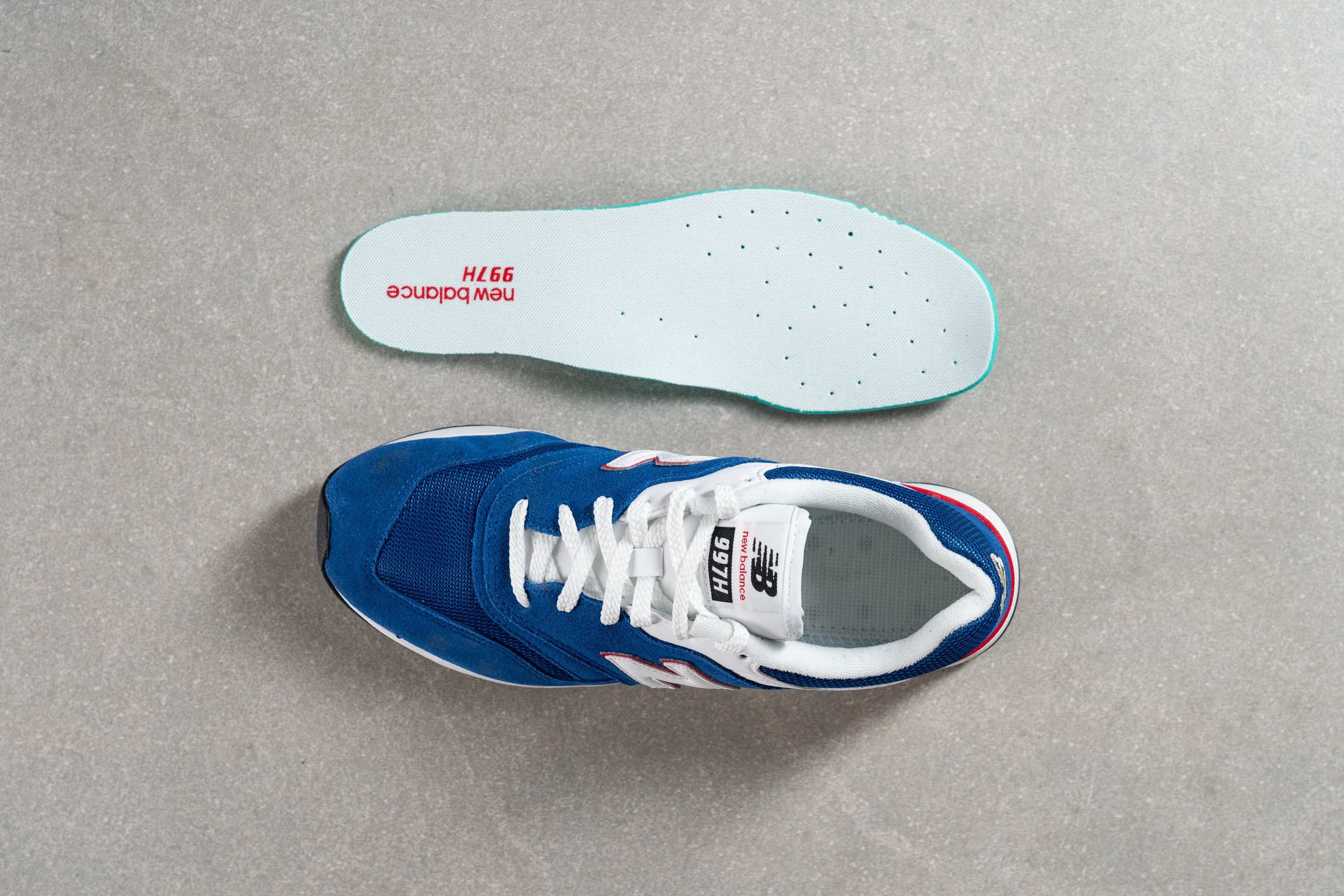
| 997H | Yes |
Reflective elements
The 997H did not have any reflective overlays on it. Usage should only be in well-lit conditions.
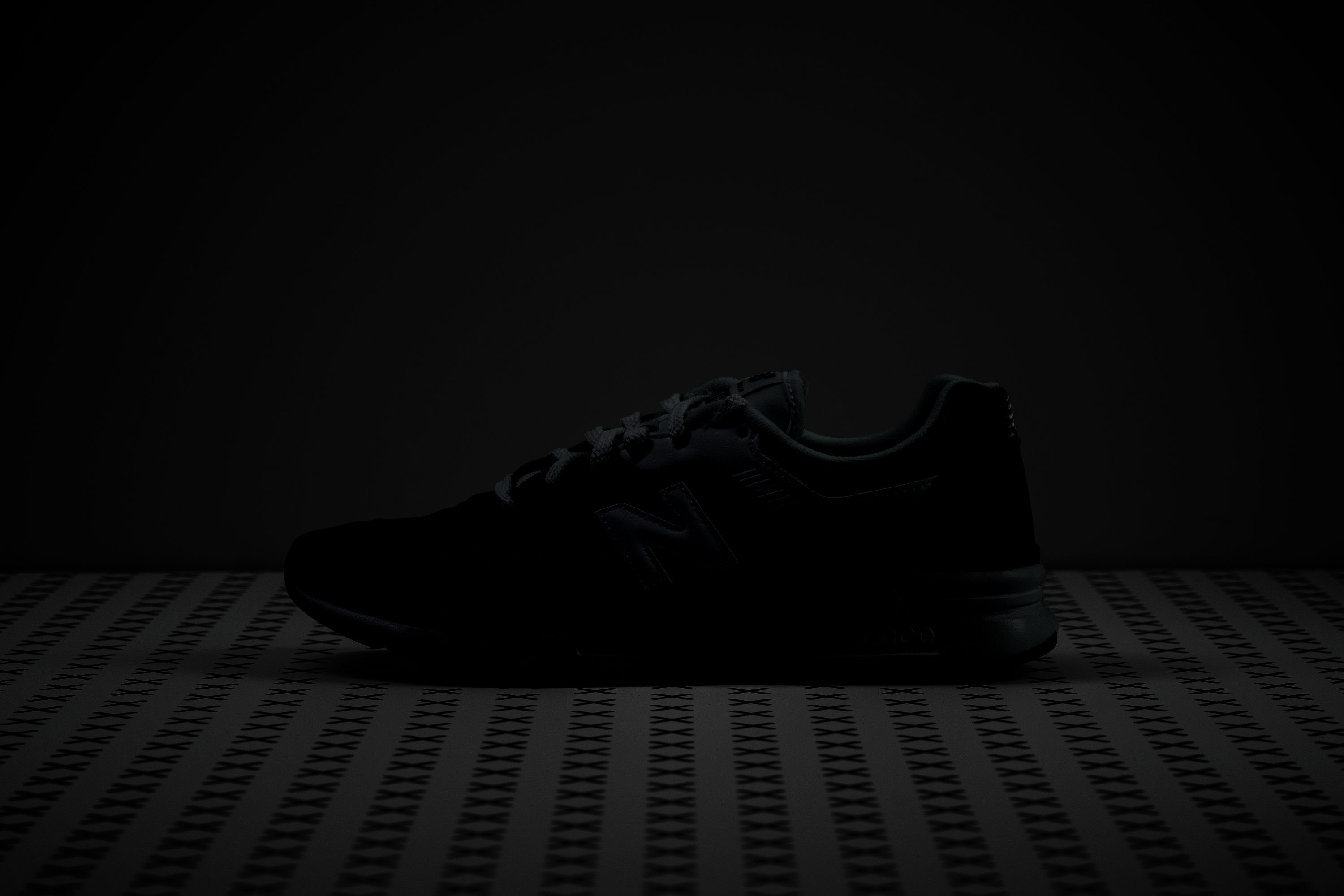
| 997H | No |
Tongue padding
The tongue felt nice even when we were not wearing socks. Its surface material was soft, and the padding felt like a gentle duvet on top of our feet.
Our caliper measured it to be 9.6 mm thick.
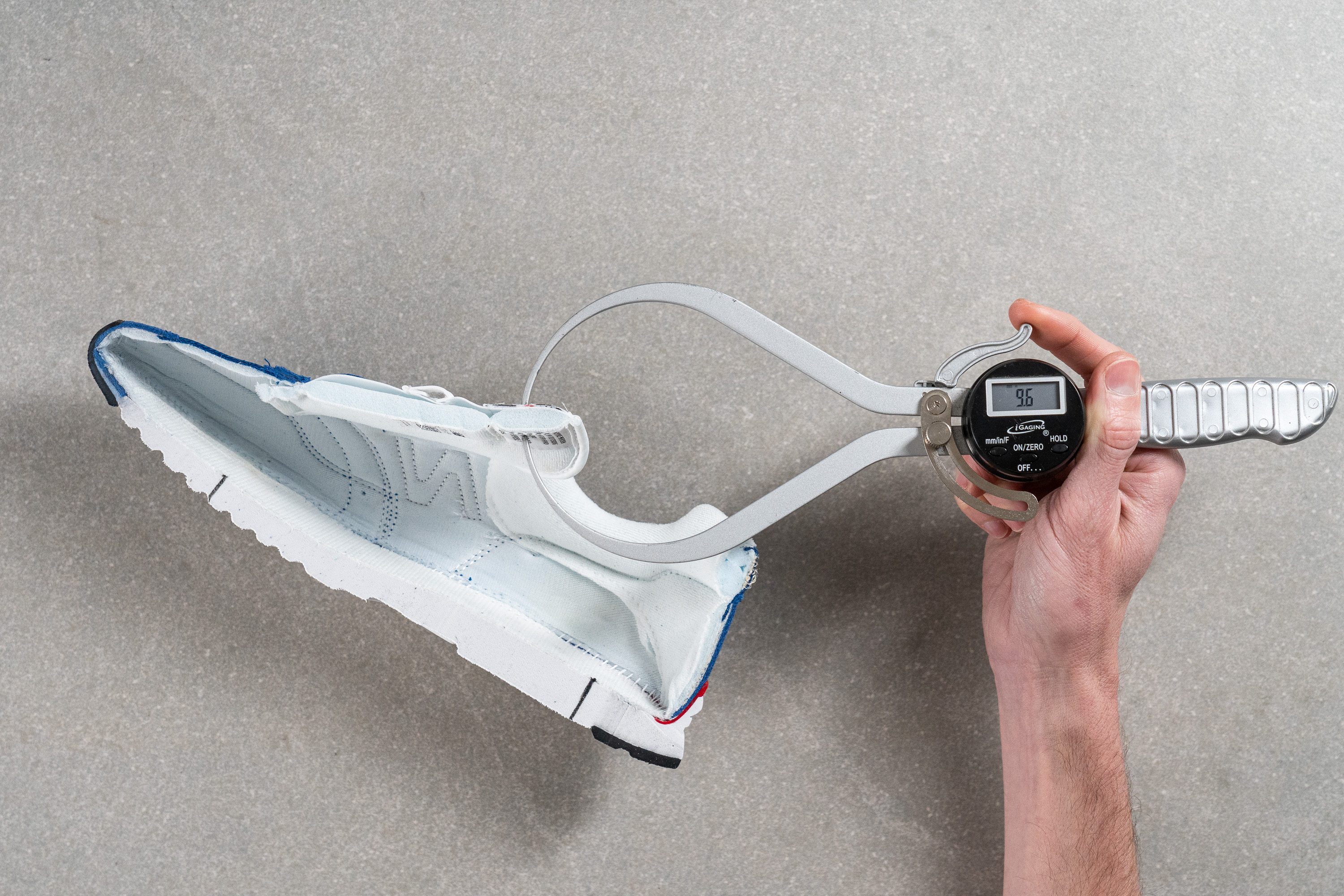
| 997H | 9.6 mm |
| Average | 9.6 mm |
Tongue: gusset type
This sneaker from New Balance is not at all gusseted. Well, it's a blessing that it's not. Had it been fully gusseted, it would have hampered so much with ventilation.
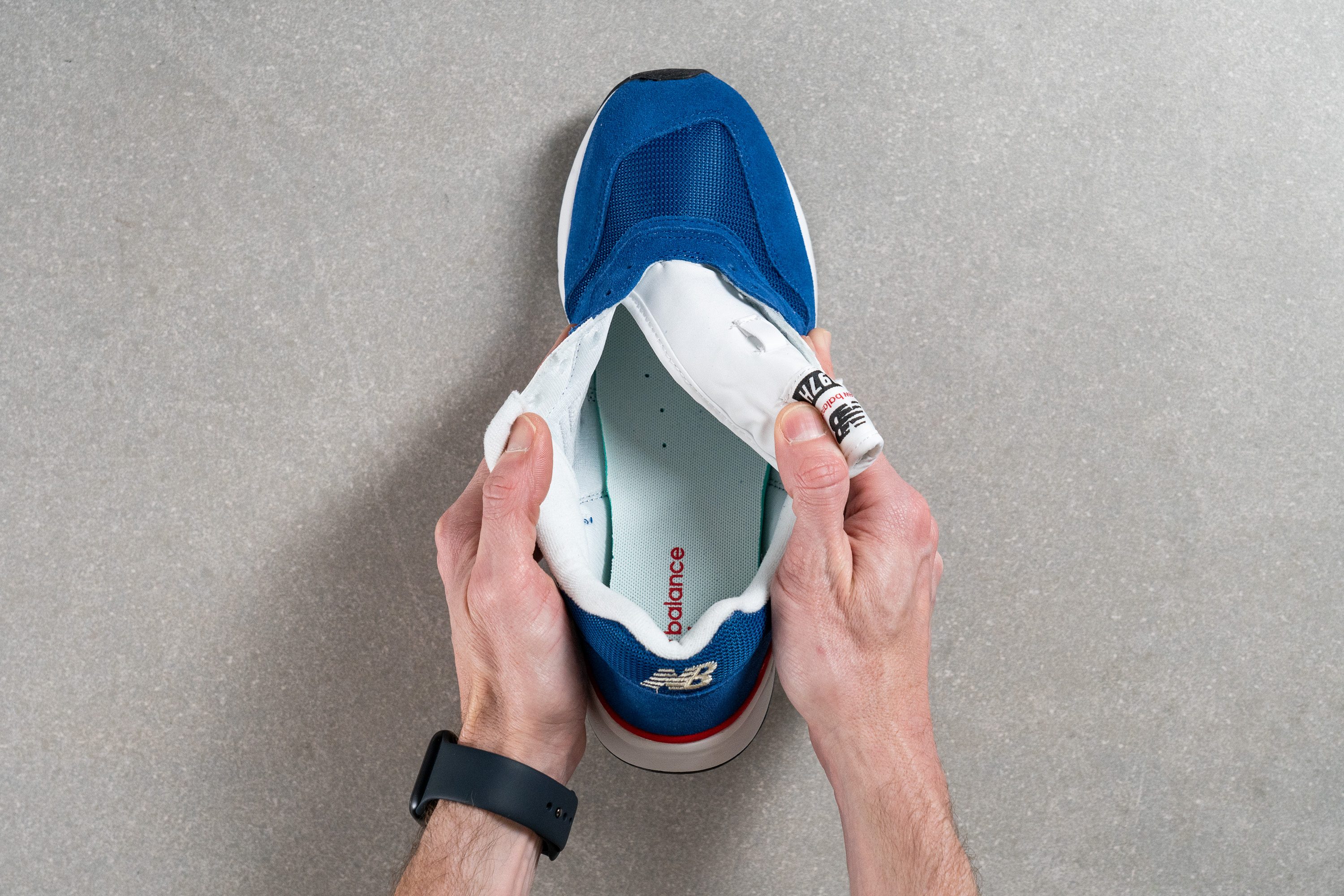
| 997H | None |
Heel tab
The New Balance 997H did not have any heel tab. We have no complaints about this because (1) the shoe did not really need one and (2) the absence of the heel tab allowed for a more streamlined look.
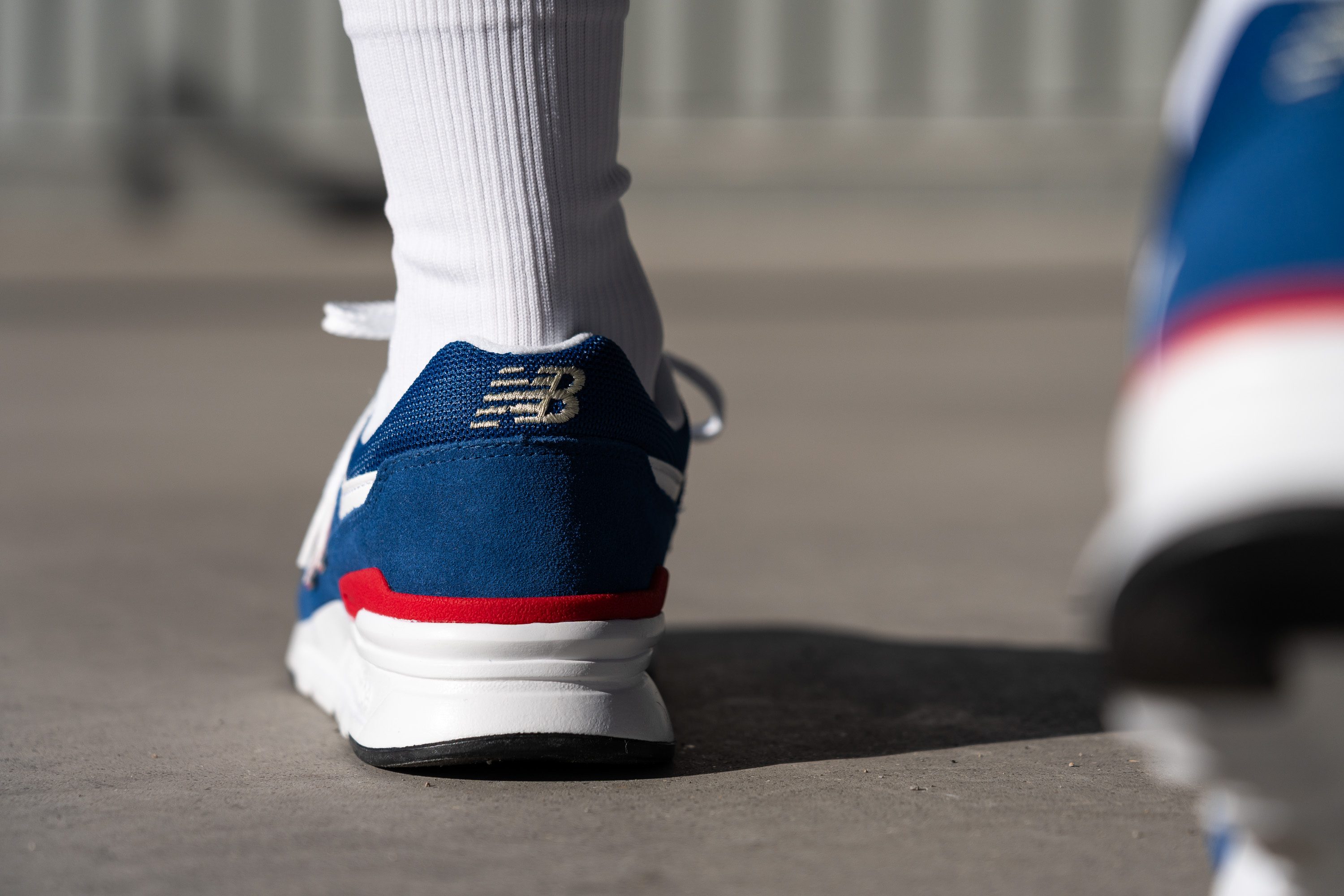
| 997H | None |

